Page reprinted by
permission from the American Thinker:
http://www.americanthinker.com/articles/../2011/12/throw_em_all_outand_good_riddance.html
Return to Index
NOVEMBER
2011
LAWLESSNESS AND
RACIALISM RUN RAMPANT IN JUSTICE DEPARTMENT
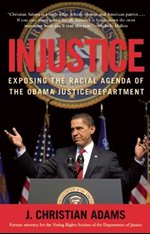 As America's premier federal
law enforcement agency, the Justice Department is supposed to be color-blind and
immune from party politics.
As America's premier federal
law enforcement agency, the Justice Department is supposed to be color-blind and
immune from party politics.
"Not so in the Obama Justice Department," says whistleblower and former DOJ
lawyer J. Christian Adams in his shocking new exposé, Injustice: Exposing the
Racial Agenda of the Obama Justice Department. (Regnery, 256 pages)
Adams—who blew the whistle on the Justice Department's handling of the
infamous New Black Panther Party voter intimidation case—witnessed first-hand
the DOJ's aggressive radical agenda, and is now revealing the truth about the
most lawless Justice Department ever.
Divulging never-before-published details on several important cases—including
the Black Panther case—Injustice exposes how the very government department
responsible for enforcing equal protection has been overrun by radicals bent on
furthering a fringe political agenda.
J. Christian Adams
served for five years as an attorney in the Voting Section of the United States
Department of Justice. In that capacity, he brought cases to protect a wide
variety of racial minorities, including blacks, Hispanics, and the first ever
application of the Voting Rights Act to protect white voters. A former general
counsel to the South Carolina Secretary of State, he is now a practicing
attorney and a contributing writer to Pajamas Media.
Return to Index
JANUARY 2011
A MURDER MYSTERY FROM ONE OF
OUR FAVORITE JUDGES
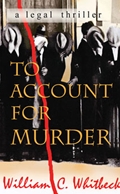 Loss haunts
Charlie Cahill. He has lost his belief in the great game of the law, a game that
is fixed from the beginning. He lost his father, who drowned during Prohibition
smuggling whiskey across the Detroit River. He lost his left arm below the elbow
to German machine-gun fire on D-Day. And he may lose the one thing that still
matters to him, the woman who rescued him from his own despair.
Loss haunts
Charlie Cahill. He has lost his belief in the great game of the law, a game that
is fixed from the beginning. He lost his father, who drowned during Prohibition
smuggling whiskey across the Detroit River. He lost his left arm below the elbow
to German machine-gun fire on D-Day. And he may lose the one thing that still
matters to him, the woman who rescued him from his own despair.
That woman is Sarah Maynard. She has chestnut hair with a single white streak, a
wicked laugh, a thirst for love, and a corrupt state senator for a husband. With
a probe into corruption at the state capital about to begin, the police find the
senator dead in the middle of a cornfield. Cahill is not surprised. As he says
in the opening chapter, “I knew nothing about an investigation. But I knew all
about the senator. After all, I’d shot him.” —Set in post-war Michigan, the
book’s shattering climax takes place at Jackson State
Penitentiary—“Jacktown”—the world’s largest walled prison. There, Cahill must
choose between saving Sarah Maynard and his own conscience.
At one level this is simply a story out of the past about the killing of a state
senator. At another level it’s about loss and its consequences. But it is also
about truth, deception, and the swirling shades of gray that lie between the
two. Ultimately, it is about identity and a terrible secret kept in silence
across the decades.
Judge WILLIAM C. WHITBECK writes for a living. The legendary Chief Judge of the
Michigan Court of Appeals—one of the country’s largest and busiest appellate
courts—he still sits on that court, authoring opinions ranging from the simplest
slip-and-fall cases to the murder conviction of Jack Kevorkian. During his long
legal and political career, he’s been a counselor to three Michigan governors.
He and his wife Stephanie live in historic downtown Lansing in a renovated 1878
home—just blocks from Michigan's Capitol, a brooding presence in his riveting
first novel. As a practicing attorney and a judge, he has seen the legal system
from both sides enabling him to lay that system bare. (From Permanent Press, 232
pages.)
Return to Index
NOVEMBER 2009
WHY IS SAUL ALINSKY
IMPORTANT?
The following article was written in 2000 by "The Wanderer."
It explains the philosophy of Saul Alinsky, one of Barack Obama's heroes.
Saul Alinsky and the Lessons
He Taught Bill and Hillary
Author: Rules for Radicals by Saul Alinsky Courtesy the Wanderer
Saul Alinsky wrote two books outlining his organizational
principles and strategies: Reveille for Radicals (1946) and Rules for Radicals
(1971).
Rules for Radicals opens with a quote about Lucifer, written by Saul Alinsky:
"Lest we forget at least an over-the-shoulder acknowledgment to the very first
radical: from all our legends, mythology, and history (and who is to know where
mythology leaves off and history begins -- or which is which), the first radical
known to man who rebelled against the establishment and did it so effectively
that he at least won his own kingdom -- Lucifer."
In Rules for Radicals, Alinsky says: "Here I propose to present an arrangement
of certain facts and general concepts of change, a step toward a science of
revolution." He builds on the tactical principles of Machiavelli: "The Prince
was written by Machiavelli for the Haves on how to hold power. Rules for
Radicals is written for the Have-nots on how to take it away."
Rules for Radicals is concerned with the acquisition of power: "my aim here is
to suggest how to organize for power: how to get it and how to use it." This is
not to be done with assistance to the poor, nor even by organizing the poor to
demand assistance: "...[E]ven if all the low-income parts of our population were
organized ... it would not be powerful enough to get significant, basic, needed
changes."
Alinsky advises the organizer to target the middle class, rather than the poor:
"Organization for action will now and in the decade ahead center upon America's
white middle class. That is where the power is."
Alinsky is interested in the middle class solely for its usefulness: "Our rebels
have contemptuously rejected the values and the way of life of the middle class.
They have stigmatized it as materialistic, decadent, bourgeois, degenerate,
imperialistic, war-mongering, brutalized and corrupt. They are right; but we
must begin from where we are if we are to build power for change, and the power
and the people are in the middle class majority."
To accomplish this, Alinsky writes that the organizer must "begin to dissect and
examine that way of life [the middle class lifestyle] ... He will know that
'square' is no longer to be dismissed as such -- instead his own approach must
be 'square' enough to get the action started."
Rules for Radicals defends belief that the end justifies the means: "to say that
corrupt the ends," writes Alinsky, "is to believe in the immaculate conception
of ends and principles ... the practical revolutionary will understand ...
[that] in action, one does not always enjoy the luxury of a decision that is
consistent both with one's individual conscience and the good of mankind."
Altogether, Alinsky provides eleven rules of the ethics of means and ends. They
are morally relativistic:
"The practical revolutionary will understand Goethe's 'conscience is the virtue
of observers and not of agents of action'; in action, one does not always enjoy
the luxury of a decision that is consistent both with one's individual
conscience and the good of mankind."
"The second rule of the ethics of the means and ends is that the judgment of the
ethics of means is dependent on the political position of those sitting in
judgment." Alinsky elaborates his meaning on this point, saying that if you were
a member of the underground Resistance, "... then you adopted the means of
assassination, terror, property destruction, the bombing of tunnels and trains,
kidnapping, and the willingness to sacrifice innocent hostages to the end of
defeating the Nazi's. Those who opposed the Nazi's conquerors regarded the
Resistance as a secret army of selfless, patriotic idealists ...." Rules for
Radicals is therefore concerned with how to win. "...[I]n such a conflict,
neither protagonist is concerned with any value except victory."
"The third rule of the ethics of means and ends is that in war the ends
justifies almost any means."
"There can be no such thing as a successful traitor, for if one succeeds, he
becomes a founding father."
Rules for Radicals teaches the organizer that he must give a moral appearance
(as opposed to behaving morally): "All effective action requires the passport of
morality."
The tenth rule of the ethics of means and ends states "that you do what you can
with what you have and clothe it with moral arguments ... Moral rationalization
is indispensable at all times of action whether to justify the selection or the
use of ends or means."
Rules for Radicals provides the organizer with a tactical style for community
organization that assumes an adversarial relationship between groups of people
in which one either dominates or is dominated.
"The first rule of power tactics is: power is not only what you have but what
the enemy thinks you have."
"Wherever possible go outside the experience of the enemy. Here you want to
cause confusion, fear, and retreat."
"Make the enemy live up to their own book of rules. You can kill them with this.
They can no more obey their own rules than the Christian church can live up to
Christianity."
Ridicule is man's most potent weapon. It is almost impossible to counterattack
ridicule. Also, it infuriates the opposition, who then react to your advantage."
"The threat is generally more terrifying than the thing itself."
"In a fight almost anything goes. It almost reaches the point where you stop to
apologize if a chance blow lands above the belt."
"Pick the target, freeze it, personalize it, and polarize it."
One of the criteria for picking the target is the target's vulnerability ... the
other important point in the choosing of a target is that it must be a
personification, not something general and abstract."
"The enemy properly goaded and guided in his reaction will be your major
strength."
Saul Alinsky urged the active and deliberate "conscious-raising" of people
through the technique of "popular education." Popular education is a method by
which an organizer leads people to a class-based interpretation of their
grievances, and to accept the organizer's systemic solutions to address those
grievances. "Through the People's Organization these groups [of citizens]
discover that what they considered primarily their individual problem is also
the problem of others, and furthermore the only hope for solving an issue of
titanic proportions is by pooling all their efforts and strengths. That
appreciation and conclusion is an educational process."
Rules for Radicals stresses organizational power-collecting: "The ego of the
organizer is stronger and more monumental than the ego of the leader. The
organizer is in a true sense reaching for the highest level for which a man can
reach -- to create, to be a 'great creator', to play God." Alinsky considered
Hillary a terrific "organizer" and wanted her to become his protege. She
declined. She had bigger fish to fry. She learned her lessons well. She and Bill
have employed Alinsky's tactics probably better than anyone else.
Until now. . .
Return to Index
JUNE
2009
WHY STATES ARE
SOVEREIGN
 Kevin R. C. Gutzman, associate
professor of history at Western Connecticut State University, has written
Virginia's American Revolution: From Dominion to Republic, 1776-1840
(Lexington Press, 248 pages) exploring the assumptions of sovereignty the
colonies had when they ratified the Constitution.
Kevin R. C. Gutzman, associate
professor of history at Western Connecticut State University, has written
Virginia's American Revolution: From Dominion to Republic, 1776-1840
(Lexington Press, 248 pages) exploring the assumptions of sovereignty the
colonies had when they ratified the Constitution.
Virginia's American Revolution
follows the Virginia revolutionaries from their decision for independence on May
15, 1776, through the following 60 years—when the last of them finally passed
from the scene. To their surprise, the decision to break with Great Britain
entailed reconsideration of virtually all of their major political and social
institutions, from the established church, their aristocratic state government,
and feudal land tenures to slavery and their federal relations with the other
American states. Some of these issues, such as the place of the Church of
England in the newly republican Virginia, received quick resolutions; others,
such as the nature of the relationship between the elite and other men, were not
so easily decided. All of them were considered against the backdrop of
Virginia's decline from preeminence in the Revolution and early Republic to the
position of just another state in the age of Jackson. By following Virginia's
American Revolution from start to finish, this account shows why so many
revolutionaries in the Old Dominion died doubting that their great struggle had
been worth the effort.
Return to Index
OCTOBER
2008
MAKERS AND TAKERS
 In a new book by Peter
Schweizer, Makers and Takers (Doubleday, 258 pages), he expands his
critique of modern American liberals to contend that liberalism not only leads
to social decay, but can also lead to personal decay. Drawing upon polls and
psychological studies, the author argues that conservatives work harder, feel
happier, have closer families, take fewer drugs, give more generously, value
honesty more, are less materialistic and envious, whine less and even hug their
children more than liberals.
In a new book by Peter
Schweizer, Makers and Takers (Doubleday, 258 pages), he expands his
critique of modern American liberals to contend that liberalism not only leads
to social decay, but can also lead to personal decay. Drawing upon polls and
psychological studies, the author argues that conservatives work harder, feel
happier, have closer families, take fewer drugs, give more generously, value
honesty more, are less materialistic and envious, whine less and even hug their
children more than liberals.
Schweizer is noticeably
silent on current affairs; instead, he focuses on the culture wars of the 1990s,
demonstrating how Clinton lied and did so in a fine fashion, that Al Gore has
also told lies and that the Clinton administration was notable for its tolerant
attitude toward drugs. Schweizer refrains from making substantive commentary on
the upcoming election; he spends more time attacking Garrison Keillor, for whom
he reserves a special distaste. The readable prose and vigorous defense of
Republican voters ensure that this book—despite its dated material and lack of
analysis of the current campaign—will rally and rouse conservatives.
Return to Index
JULY
2008
ENVIRONMENTALISM EXPOSED
 The
Competitive Enterprise Institute (CEI) announced a provocative new book on
environmental policy, Blue Planet in Green Shackles by Václav Klaus, President
of the Czech Republic. President Klaus makes the case that policies being
proposed to address global warming are not justified by current science and are,
in fact, a dangerous threat to freedom and prosperity around the world.
Klaus argues that the environmental movement has transformed itself into an
ideology that seeks to restrict human activities at any cost, while pursuing an
impossible utopian dream of a perfectly "natural" world. The supposed threat of
human civilization against a fragile Earth has become an article of faith,
especially in the realm of global warming activism.
The
Competitive Enterprise Institute (CEI) announced a provocative new book on
environmental policy, Blue Planet in Green Shackles by Václav Klaus, President
of the Czech Republic. President Klaus makes the case that policies being
proposed to address global warming are not justified by current science and are,
in fact, a dangerous threat to freedom and prosperity around the world.
Klaus argues that the environmental movement has transformed itself into an
ideology that seeks to restrict human activities at any cost, while pursuing an
impossible utopian dream of a perfectly "natural" world. The supposed threat of
human civilization against a fragile Earth has become an article of faith,
especially in the realm of global warming activism.
"The largest threat to freedom, democracy,
the market economy, and prosperity at the end of the 20th and at the beginning
of the 21st century is no longer socialism," writes Klaus. "It is, instead, the
ambitious, arrogant, unscrupulous ideology of environmentalism." The
publication of Blue Planet in Green Shackles - What is Endangered: Climate or
Freedom? (100 pages) continues the CEI's history of fighting alarmist climate
policies. CEI has long argued that whatever challenges future climate changes
might bring, the worst possible response is to restrict human freedom and slow
economic growth and innovation.
"Today, the global warming debate raging
in both the United States and Europe has become extremely contentious. On both
sides of the Atlantic, the debate has metastasized into cultural warfare against
economic liberty," writes CEI President Fred L. Smith, Jr. in the book's
foreword. "For that reason, pro-freedom voices are needed to reframe the debate
to show how a free people can better address the challenges facing Western
civilization. To that end, we are proud to publish Blue Planet in Green
Shackles."
Return to Index
MAY
2008
POOR NATION/RICH NATION
 Benjamin Powell
has edited a study published by Stanford Economics and Finance (480 pages) with
chapters by a series of authors who have studies the economies of different
countries around the world.
Benjamin Powell
has edited a study published by Stanford Economics and Finance (480 pages) with
chapters by a series of authors who have studies the economies of different
countries around the world.
His belief that encouraging small-business entrepreneurs is
the best way to achieve and maintain general affluence. The volume
addresses countries and regions that have failed to develop because of barriers
to entrepreneurship and those that have developed by reforming the institutional
environment to protect private property rights and grant greater levels of
economic freedom.
It stresses that programs which focus on government action
fail to bring about the desired result.
Return to Index
SEPTEMBER 2007
A LOT OF PEOPLE SHOULDN'T VOTE
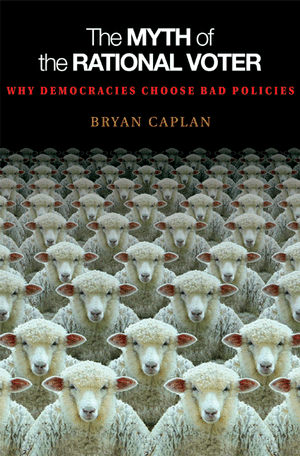 The
greatest obstacle to sound economic policy is not entrenched special interests
or rampant lobbying, but the popular misconceptions, irrational beliefs, and
personal biases held by ordinary voters. This is economist Bryan Caplan's
sobering assessment in this provocative and eye-opening book. Caplan argues that
voters continually elect politicians who either share their biases or else
pretend to, resulting in bad policies winning again and again by popular demand.
The
greatest obstacle to sound economic policy is not entrenched special interests
or rampant lobbying, but the popular misconceptions, irrational beliefs, and
personal biases held by ordinary voters. This is economist Bryan Caplan's
sobering assessment in this provocative and eye-opening book. Caplan argues that
voters continually elect politicians who either share their biases or else
pretend to, resulting in bad policies winning again and again by popular demand.
Boldly calling into question our most basic assumptions about American
politics, Caplan contends that democracy fails precisely because it does what
voters want. Through an analysis of Americans' voting behavior and opinions on a
range of economic issues, he makes the convincing case that noneconomists suffer
from four prevailing biases: they underestimate the wisdom of the market
mechanism, distrust foreigners, undervalue the benefits of conserving labor, and
pessimistically believe the economy is going from bad to worse. Caplan lays out
several bold ways to make democratic government work better--for example, urging
economic educators to focus on correcting popular misconceptions and
recommending that democracies do less and let markets take up the slack.
The Myth of the Rational Voter (Princeton University Press, 276
pages) takes an unflinching look at how people who vote under the influence of
false beliefs ultimately end up with government that delivers lousy results.
With the upcoming presidential election season drawing nearer, this
thought-provoking book is sure to spark a long-overdue reappraisal of our
elective system.
Bryan Caplan is Associate Professor of Economics at George Mason
University. He and Arnold Kling edit the Weblog EconLog.
Return to Index
JULY
2007
A HERO TO REMEMBER
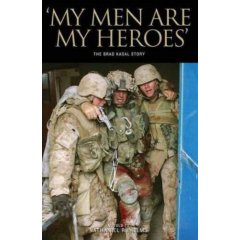 Nathaniel
Helms, in My Men Are My Heroes: The Brad Kasal Story, (Meridith
Books, 288 pages) tells the story of a man from Afton, Iowa, a combat veteran
with 20 years experience, who as a Sergeant Major in the Marine Corps performed
extraordinarily under fire.
Nathaniel
Helms, in My Men Are My Heroes: The Brad Kasal Story, (Meridith
Books, 288 pages) tells the story of a man from Afton, Iowa, a combat veteran
with 20 years experience, who as a Sergeant Major in the Marine Corps performed
extraordinarily under fire.
Experience the deadly din of modern warfare and the inspiring
leadership and courage of legendary First Sergeant Brad Kasal in this riveting
new book. It's a page-turning, first-hand account of Kasal's courageous mission
to rescue fallen comrades under intense enemy fire during the Battle of Fallujah-actions
that earned him the distinguished Navy Cross, America's second highest military
award. This stunning, unforgettable account shows an American hero rising to the
challenge of world events with leadership, valor, and loyalty.
Return to Index
FEBRUARY 2007
RONALD REAGAN: THE CRUSADER
Review by Herbert E. Meyer -- Ronald Reagan: The Crusader, by Paul Kengor
(Regan/HarperCollins, 412 pages)
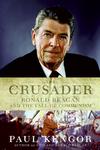 The complicated business of understanding how Ronald Reagan
led the Free World to victory in the Cold War has just become much easier.
Run to your nearest bookstore and buy a copy of The Crusader. In one
beautifully-written volume, Grove City College Professor Paul Kengor's got the
whole story - completely, accurately, and with more fascinating and
never-before-reported details about how Ronald Reagan succeeded -- than any
other Cold War historian, including "official biographer" Edmund Morris.
The complicated business of understanding how Ronald Reagan
led the Free World to victory in the Cold War has just become much easier.
Run to your nearest bookstore and buy a copy of The Crusader. In one
beautifully-written volume, Grove City College Professor Paul Kengor's got the
whole story - completely, accurately, and with more fascinating and
never-before-reported details about how Ronald Reagan succeeded -- than any
other Cold War historian, including "official biographer" Edmund Morris.
While the details in The Crusader are eye-opening
- Kengor somehow got his hands on more secret documents than the KGB - it's
the insights that leap off the page. For instance, while it's true that
Reagan was the first actor ever elected President, Kengor reminds us that
Reagan was also the first union president ever elected to the US
presidency. And Kengor shows how Reagan's work for the Screen Actors Guild
(SAG) formed his political philosophy and, perhaps more importantly, gave
Reagan the practical experience both of industrial negotiations and fighting
communism on the ground.
The Toughest Negotiator
Reagan was elected president of SAG seven times - which
makes him among the most successful union bosses in American history, by the
way - and as a result he probably engaged in more negotiating sessions with
hard-headed corporate CEOs and egomaniacal prima donnas within the
union itself than anyone ever elected to the White House. No wonder
that, years later, Reagan ran circles around the Kremlin - and around a
Democratic-controlled Congress. (Someone once asked the President if it was
tough negotiating with the Russians. Reagan replied, "No, it was tough
negotiating with Jack Warner.")
Moreover, in the late 1940s and early 1950s SAG was among
the communists' top takeover targets. The communists wanted control of all
our country's unions, of course, but SAG topped their list simply because it
was "Hollywood" and so its influence on American culture was enormous. As
Kengor shows, it was Reagan who led the fight to stop the communists. It's an
astonishing thought, but Reagan was the only American politician who had
blocked a communist takeover of anything before reaching the White
House. Thirty years later, had Fidel Castro and the Kremlin's leaders
remembered this, perhaps they wouldn't have been so surprised when President
Reagan kicked them out of Grenada.
Kengor provides a brief but riveting summary of Reagan's
public utterances during the decades between the end of his Hollywood career
and his White House years. What emerges from the long-forgotten quotes that
Kengor has found is not only Reagan's deep interest in and detailed grasp of
world affairs - and remember, in these years he had no staffers to brief him
or do his research -- but his focus on key symbolic issues long before he held
the world stage. For instance, in a 1967 CBS-TV debate with Senator Robert
Kennedy - it was later conceded by everyone, including RFK himself, that
Reagan had won the debate handily -- Reagan got onto the subject of US-Soviet
relations:
"When we signed the Consular Treaty with the Soviet
Union, I think there were things we could've asked for in return. I think
it would be very admirable if the Berlin Wall, which was built in direct
contravention to a treaty, should disappear. I think this would be a step
toward peace and toward self-determination for all people, if it were."
In early June 1987, when the draft of President Reagan's
forthcoming speech at the Brandenburg Gate circulated through the National
Security Council and the State Department, those officials who tried to edit
out the President's now-famous line -- "Mr. Gorbachev, tear down this
wall" - had no idea how strongly the President felt about this, or even
that he had been calling for the Wall's destruction for more than 20 years.
Hitting the Kremlin Hard
Of course, most of The Crusader deals with the
White House years, and Kengor's account of how the Reagan team ended the Cold
War peacefully is a masterpiece of geo-strategic reporting. Kengor has gotten
his hands on just about the entire series of "NSDDs" - National Security
Decision Directives - produced by the Reagan team. And he uses excerpts from
these NSDDs to explain, more clearly than any previous historian, that the
President's policy initiatives were the result of a carefully thought-through,
meticulously detailed strategy based on identification of the Soviet Union's
key weaknesses - chief among them its imploding economy - followed by the
execution of specific policies designed to take advantage of these weaknesses
by putting more pressure on the Kremlin than it could withstand.
These included policies to limit Soviet energy exports,
thus blocking the Soviet Union's access to desperately needed hard currency,
funding and otherwise supporting anti-communist insurgencies, and of course
publicly declaring the Soviet Union to be "the focus of evil in the world" -
which rallied oppressed citizens from Poland to Vladivostok and which, even
more importantly, terrified the Kremlin's ageing leaders because, unlike the
President's domestic foes, they knew it was true.
Kengor correctly gives the bulk of the credit to the
President himself, and he shows again and again how it was Reagan personally
who called the shots in Washington. But Kengor also shows how the varsity
team that Reagan brought with him to Washington - including Secretary of
Defense Caspar Weinberger, CIA Director William Casey, and National Security
Adviser Judge William Clark - played key roles. And he generously gives
credit to the various aides of these officials who labored long, hard and
usually anonymously to get the job done.
What emerges from Kengor's reporting, and with a stunning
clarity, is the sheer executive competence of Reagan and his team. They
started with a goal - ending the Cold War with victory for the Free World --
developed a strategy to achieve that goal, worked out tactics to fulfill their
strategy, then executed their plan while making whatever course corrections
were required as events unfolded. In short, even though the President
couldn't name all 15 members of the Politburo - in truth, he couldn't name all
10 members of his own Cabinet - he was a superb CEO. (Actually, Reagan was a
superb CEO precisely because he didn't waste his time and energy on details;
he focused on setting an objective, bringing on-board a team capable of
achieving that objective, then leading the charge.)
The Crusader should be read by any politician who
wants to understand the difference between conveying the illusion of success,
and succeeding. And centuries from now, The Crusader will be read by
anyone who wants to know how the Cold War really ended.
Herbert E. Meyer served during the Reagan
Administration as Special Assistant to the Director of Central Intelligence
and Vice Chairman of the CIA's National Intelligence Council.
Reprinted from:
http://www.americanthinker.com/2007/01/ronald_reagan_the_crusader.html, January 15, 2007
Return to Index
SEPTEMBER 2006
THE CONQUEST OF AMERICA
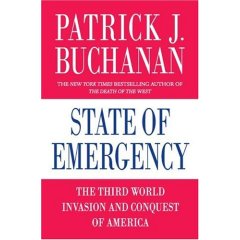 Pat Buchanan
has a new book out which is receiving rave reviews in every conservative venue.
Pat Buchanan
has a new book out which is receiving rave reviews in every conservative venue.
In State of Emergency: The Third World Invasion and
Conquest of America (Thomas Dunne Books, 320 pages) Buchanan argues that the
immigration system is a disaster, the melting pot is broken and failure to act
soon will endanger America as we know it.
Many Mexicans, who are by far the largest group of immigrants
(particularly illegal immigrants) have no interest in becoming American.
They believe that American wrongfully stole the lands in the American Southwest
after the Texas War of Independence and the Mexican-American War and they should
be recaptured from the United States. This is the "Aztlan Plot" for "La
Reconquista."
He lays out his plan for immigration reform and border
security. The consensus seems to be that this is essential reading for all
Americans.
Return to Index
JUNE
2006
HE'S
BACK. . .
John Stossel has come
out with a new book, Myths, Lies, and Downright Stupidity: Get Out the
Shovel -- Why Everything You Know is Wrong
(Hyperion, 320 pages).
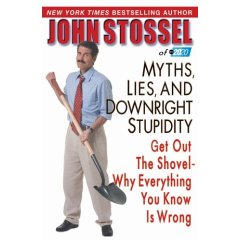 Myths and Misconceptions
covered in the book include:
Myths and Misconceptions
covered in the book include:
Is the media unbiased?
Are our schools helping or hurting our kids?
Do singles have a better sex life than married people?
Do we have less free time than we used to?
Is outsourcing bad for American workers?
Suburban sprawl is ruining America.
Money makes people happier.
The world is too crowded.
We’re drowning in garbage.
Profiteering is evil.
Sweatshops exploit people.
John Stossel takes on these and many more misconceptions,
misunderstandings, and plain old stupidity in this collection that will offer
much to love for Give Me a Break fans, and show everyone why conventional
wisdom -- economic, political, or social -- is often wrong.
Return to Index
APRIL
2006
TRUE STORIES FROM IRAQ
 Bing
West, a Marine veteran, who accompanied the First Marine Division on its sprint
to Baghdad in April-May 2003, together with his co-author, Major
General Ray L. Smith, USMC (Ret.), wrote
The March Up (Bantam, 320 pages). Unlike embedded journalists, the
authors used a captured yellow SUV to go to the front lines with any unit then
leading the battle. The result is a report of what really
happened from the heart of the action unlike anything you’ll read anywhere else.
Bing
West, a Marine veteran, who accompanied the First Marine Division on its sprint
to Baghdad in April-May 2003, together with his co-author, Major
General Ray L. Smith, USMC (Ret.), wrote
The March Up (Bantam, 320 pages). Unlike embedded journalists, the
authors used a captured yellow SUV to go to the front lines with any unit then
leading the battle. The result is a report of what really
happened from the heart of the action unlike anything you’ll read anywhere else.
F. J. “BING” WEST (right) served as Assistant Secretary of
Defense for International Security Affairs in the Reagan administration.
He was a Marine infantry officer in Vietnam, where he wrote Small Unit Action, a
firsthand description of the combat.
 He
has now written No True Glory (Bantam, 400 pages), which describes the
battle for Falluja, the superhuman courage and dedication of the Marines in
April of 2004, the withdrawal at the request of the politicians, and the second
assault in November of that year.
He
has now written No True Glory (Bantam, 400 pages), which describes the
battle for Falluja, the superhuman courage and dedication of the Marines in
April of 2004, the withdrawal at the request of the politicians, and the second
assault in November of that year.
As Max Boot stated in his Feb.20, 2006 review of the book in
The Weekly Standard: “While many other correspondents have ventured to
the front lines in Iraq, few have stayed as long as West, or brought as much
knowledge of military affairs to their work. The result is a book that …
features amazing accounts of heroism, brutality, perseverance, and gallows
humor.”
Return to Index
FEBRUARY 2006
NEVER FORGET
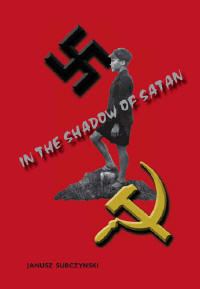 In
the Shadow of Satan (Keller Publishing, 316 pages) is a compilation of
memories, first of a young boy, and then of a young adult, from the bloodiest
period of 20th century Europe—during the days of the Second World War and Soviet
occupation. These tragic events are described as seen through the young eyes of
an eyewitness to history. Having lived daily in the shadow of those two satans—Nazism
and communism—the author startlingly reveals an even more true picture than
contemporary writing could ever accomplish.
In
the Shadow of Satan (Keller Publishing, 316 pages) is a compilation of
memories, first of a young boy, and then of a young adult, from the bloodiest
period of 20th century Europe—during the days of the Second World War and Soviet
occupation. These tragic events are described as seen through the young eyes of
an eyewitness to history. Having lived daily in the shadow of those two satans—Nazism
and communism—the author startlingly reveals an even more true picture than
contemporary writing could ever accomplish.
The American people—even professional historians—have quite
limited information on the events which took place in Poland in the years
1939–1989. This simple tale provides a realistic picture of those days, and also
shows that the human spirit is invincible and is able to survive and grow even
in very difficult environments.
Janusz Subczynski, the author, is a friend of your editor.
He was born in Poland, completed his primary and secondary education partially
in the underground during the Second World War. He attended medical school in
Poznan, and received his diploma of physician (M.D.). Independently, he
also completed the study of psychology at the University of Poznan and obtained
a Masters in Psychology. He became a Specialist of the Polish Board of
Neurosurgery. He arrived in the United States to be trained in stereotactic
surgery of the brain, and, after establishing this type of surgery in Warsaw,
Poland, returned to the United States. He obtained the title of the Diplomat of
American Board of Neurological Surgery and also became a Fellow of the American
College of Surgery. For over twenty-five years, he worked first as an
independent neurosurgeon, then as a chief of the section of neurosurgery at St.
John Hospital and Medical Center in Detroit. After retirement, he wrote three
books, published first in Polish. Dr. Subczynski was involved in anticommunist
action as a member and then coordinator of the Polish-American organization
POMOST. He is currently retired in the warm climate of Florida, devoting his
time to writing and providing political commentary on American/Polish radio.
The book gives you a real idea of the horrors of living in
Poland under the Nazis and Stalin and is fascinating reading.
Return to Index
AUGUST
2005
MEN IN BLACK
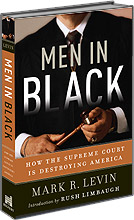 Mark R. Levin,
one of America's preeminent conservative commentators and constitutional lawyers
has weighed in on the federal judiciary with his Men in Black: How the
Supreme Court is Destroying America. (Regnery, 256 pages)
Mark R. Levin,
one of America's preeminent conservative commentators and constitutional lawyers
has weighed in on the federal judiciary with his Men in Black: How the
Supreme Court is Destroying America. (Regnery, 256 pages)
In the book he highlights some of the spectacular failures --
the justices and the rulings -- and explains how their liberal rulings, which
figure out how to justify a policy choice they favor, threaten the very
foundations of our society and ignore the very text of the Constitution itself.
In highlighting how these judicial rulings upheld slavery and
segregation, as well as creating rights from whole cloth, and disparaging the
roles of the people and the legislatures, he shows that the arrogant justices
who ignore the constitution are the biggest threat to America today.
Return to Index
JUNE 2005
ZELL MILLER IS AT IT AGAIN
 Expanding
on a theme he raised on the Senate floor in February of 2004, Zell Miller wrote
A Deficit of Decency (Stroud & Hall, 288 pages). The book addresses
specific issues where Miller sees a need to return to a basic sense of duty.
Expanding
on a theme he raised on the Senate floor in February of 2004, Zell Miller wrote
A Deficit of Decency (Stroud & Hall, 288 pages). The book addresses
specific issues where Miller sees a need to return to a basic sense of duty.
He speaks candidly about the values that led him to attack
his own party and deliver a keynote speech at the 2004 Republican National
Convention. These same values, he believes, are desperately needed at the
heart of American culture.
Miller writes from the unique perspective of his rise to and
service as Governor and United States Senator, drawing upon public service in
each o0f the past six decades. He has written six books, including
Corps Values and the New York Times bestseller A National Party No More.
Return to Index
MARCH 2005
SPIRIT OF '76
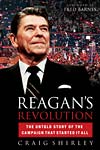 In Reagan's Revolution
(Thomas Nelson, 448 pages) Craig Shirley tells the fascinating story of the 1976
presidential campaign which redefined the Republican party, reshaped national
politics, and ended the reign of liberalism.
In Reagan's Revolution
(Thomas Nelson, 448 pages) Craig Shirley tells the fascinating story of the 1976
presidential campaign which redefined the Republican party, reshaped national
politics, and ended the reign of liberalism.
What few people realize is that Reagan's
revolution did not begin when he took office in 1980, but in his failed
presidential challenge to Gerald Ford in 1975-76.
This is the remarkable story of that
historic campaign -- one that, as Reagan put it, turned a party of "pale
pastels" into a national party of "bold colors." Featuring interviews with
a myriad of politicos, journalists, insiders and observers, Craig Shirley relays
intriguing, never-before-told anecdotes about Reagan, his staff, the campaign,
the media, and the national parties. He shows how Reagan, instead of
following the lead of the ever-weakening Republican party, brought the party to
him and almost single-handedly revived it.
Return to Index
SEPTEMBER
2004
OUR AMERICAN SOLDIER
 In
this riveting memoir, American Soldier, (ReganBooks, 590 pages), General
Tommy Franks retraces his journey from a small-town boyhood in Oklahoma and
Midland, Texas, through a lifetime of military service. From Vietnam,
through the Cold War, Operation Desert Storm, he tells the story of how he
became the senior American military officer in the most dangerous region on
earth.
In
this riveting memoir, American Soldier, (ReganBooks, 590 pages), General
Tommy Franks retraces his journey from a small-town boyhood in Oklahoma and
Midland, Texas, through a lifetime of military service. From Vietnam,
through the Cold War, Operation Desert Storm, he tells the story of how he
became the senior American military officer in the most dangerous region on
earth.
Drawing on his own recollections and
military records declassified for this book, Franks offers the first true
insider's account of the war on terrorism that has changed the world since
September 11, 2001. He gives the full story on Operation Enduring Freedom
in Afghanistan, followed by the bold strategy in Operation Iraqi Freedom which
led to the fall of Baghdad in three weeks.
He offers the unvarnished,
non-political view of the successes and short-comings of the intelligence
communities and Washington bureaucracy. He tells his soldier's story.
Return to Index
JULY 2004
THE
ROOSEVELT MYTH
 This
book, originally published in 1948, and reprinted as a 50th anniversary edition
in 1998, will enlighten readers on all the things you know that just aren't
true.
This
book, originally published in 1948, and reprinted as a 50th anniversary edition
in 1998, will enlighten readers on all the things you know that just aren't
true.
The
Roosevelt Myth, by John T. Flynn, (Laissez Faire Books, 437 pages), is a
critical account of the New Deal. It is Flynn's conviction that the image
of Franklin D. Roosevelt did not at all correspond to the man himself, and that
the years 1932 to 1945 should be seen realistically.
It
analyzes the programs initiated by Roosevelt, which, by and large, did not
achieve their goals, and the people who implemented them. It shows why
FDR's actions actually lengthened the duration of the Depression and caused more
hardship. It certainly is an eye-opening view on the Roosevelt years.
Return to Index
APRIL
2004
THE SCOURGE OF LIBERAL MEDIA
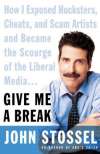 John
Stossel, 20/20 host traveled the path from crusading reporter for leftist causes
to libertarian proponent of the free market and opponent of big government.
John
Stossel, 20/20 host traveled the path from crusading reporter for leftist causes
to libertarian proponent of the free market and opponent of big government.
In Give Me a Break,
(HarperCollins, 294 pages) Stossel explains how ambitious bureaucrats,
intellectually lazy reporters, and greed lawyers make your life worse even as
they claim to protect your interests. Taking on such sacred cows as the
FDA, the War of Drugs, and scaremongering environmental activists -- and backing
up his trademark irreverence with careful reasoning and research -- he shows how
the problems that government tried and fails to fix can be solved better by the
extraordinary power of the free market.
Stossel concludes the book with a
provocative blueprint for a change: a simple plan in the spirit of the Founding
Fathers to ensure that America remains a place "where free minds -- and
free markets -- make good things happen."
Return to Index
JANUARY
2004
ASSAULTS ON PRIVATE PROPERTY
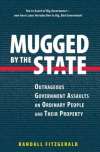 A
review in Human Events showcases Randall Fitzgerald's new book, Mugged
by the State: Outrageous Government Assaults on Ordinary People and Their
Property (Regnery, 155 pages). It describes how common, ordinary
American citizens have been subjected to government abuse. Fitzgerald, a
veteran journalist, provides many riveting examples of ranchers, homeowners and
small businessmen who have encountered the wrath of bureaucrats and regulators,
who in the zeal of enforcing cumbersome government regulations, have seized
homes, private property, cars, bank accounts, and closed down businesses in the
interest of "public safety" and the "public
good."
A
review in Human Events showcases Randall Fitzgerald's new book, Mugged
by the State: Outrageous Government Assaults on Ordinary People and Their
Property (Regnery, 155 pages). It describes how common, ordinary
American citizens have been subjected to government abuse. Fitzgerald, a
veteran journalist, provides many riveting examples of ranchers, homeowners and
small businessmen who have encountered the wrath of bureaucrats and regulators,
who in the zeal of enforcing cumbersome government regulations, have seized
homes, private property, cars, bank accounts, and closed down businesses in the
interest of "public safety" and the "public
good."
There are a few bright lights on the
horizon, mainly as a result of the Institute for Justice, a public service law
firm which specializes in fighting government abuses. Some of their
victories are showcased in this compelling book.
Return to Index
DECEMBER
2003
A PERSONAL PORTRAIT
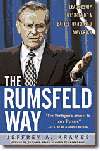 Midge
Decter, in her biography, The Rumsfeld Way: The Leadership Wisdom of a
Battle-hardened Maverick (Regan, 220 pages) follows Donald Rumsfeld from his
early years to the present. In every position he has ever held, in the
private or public sector, he has been a dogged reformer. This book
provides an enlightening and provocative look at the man The Washington Post
has called "the Articulator in Chief," and outlines the leadership
skills, methods, and strategies that have made Secretary of Defense Rumsfeld one
of today's most trusted and accomplished public figures.
Midge
Decter, in her biography, The Rumsfeld Way: The Leadership Wisdom of a
Battle-hardened Maverick (Regan, 220 pages) follows Donald Rumsfeld from his
early years to the present. In every position he has ever held, in the
private or public sector, he has been a dogged reformer. This book
provides an enlightening and provocative look at the man The Washington Post
has called "the Articulator in Chief," and outlines the leadership
skills, methods, and strategies that have made Secretary of Defense Rumsfeld one
of today's most trusted and accomplished public figures.
As was stated in the review by the
November 3, 2003 Weekly Standard: "You know a man by his enemies and
by his friends. In Rumsfeld's case, both his friends and enemies agree on
one thing: He is larger than life. Such a remarkable man deserves
several biographies, and if one of them venerates a bit, we need not worry; the
next is bound to denigrate a bit too much."
Return to Index
NOVEMBER
2003
PERSECUTION
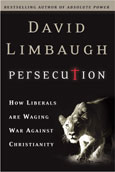 In
his new book, Persecution (Regnery, 256 pages), bestselling author
(Absolute Power) David Limbaugh makes a compelling case that liberals across the
country are waging an undeclared war on Christianity in our culture and in our
government-especially our schools. Limbaugh exposes the farce of liberal
"tolerance" and reveals the true agenda of liberals who misuse the law
to force Christianity out of the public square.
In
his new book, Persecution (Regnery, 256 pages), bestselling author
(Absolute Power) David Limbaugh makes a compelling case that liberals across the
country are waging an undeclared war on Christianity in our culture and in our
government-especially our schools. Limbaugh exposes the farce of liberal
"tolerance" and reveals the true agenda of liberals who misuse the law
to force Christianity out of the public square.
Tolerance might be the highest virtue in our popular culture,
but it doesn't often extend to Christians these days. Christians are
increasingly being driven from public life, denied their First Amendment rights,
and even actively discriminated against for their beliefs. In this relentless
exposé of political correctness run amok, David Limbaugh rips apart the liberal
hypocrisy that condones selective mistreatment of Christians in the mainstream
media, Hollywood, our schools and universities, and throughout our public life!
Return to Index
OCTOBER
2003
FIRST
LADIES
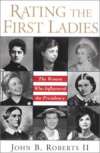 Rating
the First Ladies (Citadel Press, 288 pages), by John B Roberts, II, "is
an absorbing book that accomplishes something never before attempted: assessing,
in one book, the explicitly political contributions of each of the 37 first
ladies to the presidents of the United States -- from Martha Washington to Laura
Bush," according to Tony Blankley in the Washington Times weekly
edition of September 22-28, 2003. He went on: "Although I like to
think I am reasonably well-read on America's political history, I learned
something interesting, often relevatory, about those histories on almost every
page."
Rating
the First Ladies (Citadel Press, 288 pages), by John B Roberts, II, "is
an absorbing book that accomplishes something never before attempted: assessing,
in one book, the explicitly political contributions of each of the 37 first
ladies to the presidents of the United States -- from Martha Washington to Laura
Bush," according to Tony Blankley in the Washington Times weekly
edition of September 22-28, 2003. He went on: "Although I like to
think I am reasonably well-read on America's political history, I learned
something interesting, often relevatory, about those histories on almost every
page."
He
says that after reading the book, all those 19th century presidencies will never
merge in your mind again after reading this book. And the 20th century
first ladies you thought you knew something about, emerge as both stronger and
much more interesting than you could possibly imagine. He finds it a
first-rate book.
Return to Index
SEPTEMBER
2003
TEN LIFE
LESSONS
 In
1982, as a young man, Peter Robinson was hired as a speechwriter in the Reagan
White House. During the six years that followed, he was one of a core
group writers who became informal experts on Reagan, absorbing not just his
political positions but his personality, manner, and way of carrying
himself. The example Reagan set -- as a confident, passionate, principled,
generous-spirited older man -- molded Robinson's outlook just as he was coming
into his own.
In
1982, as a young man, Peter Robinson was hired as a speechwriter in the Reagan
White House. During the six years that followed, he was one of a core
group writers who became informal experts on Reagan, absorbing not just his
political positions but his personality, manner, and way of carrying
himself. The example Reagan set -- as a confident, passionate, principled,
generous-spirited older man -- molded Robinson's outlook just as he was coming
into his own.
At the core of How
Ronald Reagan Changed My Life (HarperCollins, 272 pages) are ten of the life
lessons Robinson learned from the fortieth President -- principles that have
guided his own life ever since. But it also offers a warm and
unforgettable portrait of a great yet ordinary man who touched the individuals
around him as surely as he did his millions of admirers around the world.
Return to Index
JULY
2003
THE DARK SIDE
 Phil Kent,
president of Southeastern Legal Foundation, lays bare the falsehoods and
distorted messages of liberalism and exposes it for what it is -- an outdated,
negative, anti-American gospel that mockingly undermines the values that made
this country great. In The Dark Side of Liberalism: Unchaining the
Truth (Harbor House Books, 226 pages) he offers a fresh look at America's
big ticket issues -- race relations, political correctness, immigration,
Hollywood, the media, the United Nations, the runaway court system, the war on
terror, and Big Government's role in our lives.
Phil Kent,
president of Southeastern Legal Foundation, lays bare the falsehoods and
distorted messages of liberalism and exposes it for what it is -- an outdated,
negative, anti-American gospel that mockingly undermines the values that made
this country great. In The Dark Side of Liberalism: Unchaining the
Truth (Harbor House Books, 226 pages) he offers a fresh look at America's
big ticket issues -- race relations, political correctness, immigration,
Hollywood, the media, the United Nations, the runaway court system, the war on
terror, and Big Government's role in our lives.
Kent notes: "It is time for all Americans to step up to
the plate. The fate of our civilization, our way of life, hangs in the
balance."
Return to Index
MAY 2003
GUN MYTHS
 In
his newest book, The Bias Against Guns: Why Almost Everything You've Heard
About Gun Control Is Wrong (Regnery, 349 pages), economist John Lott, who
has held positions at Yale Law School, the University of Chicago, UCLA and
Stanford University, has put together an original study from empirical research
that demonstrates every plausible facet of the pro-gun position.
In
his newest book, The Bias Against Guns: Why Almost Everything You've Heard
About Gun Control Is Wrong (Regnery, 349 pages), economist John Lott, who
has held positions at Yale Law School, the University of Chicago, UCLA and
Stanford University, has put together an original study from empirical research
that demonstrates every plausible facet of the pro-gun position.
Because gun-control regulations impede
law-abiding citizens' access to guns, even mild gun-control regulations --
assault weapons bans, "one-gun-a-month" laws -- actually increase
crime, while right-to-carry laws lower crime and help prevent (or terminate)
terrorist attacks and "rampage" shootings. Even measures to keep
guns away from children, like "gun-free zones" and
"safe-storage" laws that require guns to be locked away, are misguided
because children need guns for self-defense (he cites news reports of kids as
young as 11 gunning down criminals).
The Bias Against Guns is must
reading for anyone concerned about the filtered distortions typical of the mass
media's onslaught against firearms.
Return to Index
APRIL
2003
THEY'RE STILL HERE
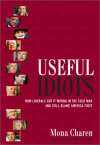 In
her recent book, Useful Idiots: How Liberals Got It Wrong in the Cold War and
Still Blame America First (Regnery, 308 pages), Mona Charen uses
Stalin's description of the American left in the Cold War to show the similarity
between today's left and the previous Communist sympathizers. She offers a
moral indictment of those public figures, politicians, entertainers and
professors who stubbornly refused to see communism as the brutal, dictatorial,
death machine it was.
In
her recent book, Useful Idiots: How Liberals Got It Wrong in the Cold War and
Still Blame America First (Regnery, 308 pages), Mona Charen uses
Stalin's description of the American left in the Cold War to show the similarity
between today's left and the previous Communist sympathizers. She offers a
moral indictment of those public figures, politicians, entertainers and
professors who stubbornly refused to see communism as the brutal, dictatorial,
death machine it was.
She compares those to the same cadre of
people who, today, blame America for the violence perpetrated by
terrorists. Charen highlights the kind of historical revisionism and
self-hatred that marked some of America's most noted public figures and warns
that the lessons learned from communism are just as relevant today.
Return to Index
MARCH
2003
THE
WORM IN THE APPLE
 J. Martin Rochester is The Curators'
Distinguished Teaching Professor of Political Science at the University of
Missouri - St. Louis. He is the author of several books on international
politics and has written widely on the subject of education.
J. Martin Rochester is The Curators'
Distinguished Teaching Professor of Political Science at the University of
Missouri - St. Louis. He is the author of several books on international
politics and has written widely on the subject of education.
In Class Warfare: Besieged Schools,
Bewildered Parents, Betrayed Kids and the Attack on Excellence (Encounter
Books), he discusses his view of elementary through high school public education
in the United States. He maintains that an inadequate emphasis on
scholarship has led to a systemic collapse of standards. Mr. Rochester
suggests that nonacademic diversions have replaced rigorous study and the
commitment to excellence has become secondary to promoting diversity and
"equity."
The book tells of Mr. Richardson's own
experiences when he moved to the suburbs of St. Louis and worked hard to try to
see that his children got a rigorous and demanding public school
education. In this effort, he uncovered the bad policies that are
obstacles to excellence which spring up overnight like mushrooms in school
systems all over the country.
Return to Index
FEBRUARY
2003
 THE
REVOLUTION
THE
REVOLUTION
This historical novel tells the story
of the American Revolution from the points of view of George Washington, Charles
Cornwallis, Nathaniel Greene, the Marquis de Lafayette and Benjamin Franklin.
Jeff Shaara, who has written previous
historical novels, Rise to Rebellion (origin of the American Revolution)
and depictions of the Civil War in Gods and Generals and The Last Full
Measure now follows through on the war years. In The Glorious
Cause, (Ballentine Books, 512 pages) the famous characters of the revolution
are explored in a readable, historically accurate fashion which makes history go
down easy.
Return to Index
JANUARY
2003
 A
MAN OF PRINCIPLE
A
MAN OF PRINCIPLE
In a meticulously researched and
penetrating analysis of the Cold War, bringing to light dozens of previously
unknown secret documents obtained from archives in Russia, Germany, Poland,
Hungary and the United States, Peter Schweizer shows Reagan to be a man with a
vision and convictions.
His anticommunist sentiments began with
his experiences in Hollywood. By the 1960s, the Soviets began a KGB file
on him when he was still governor of California. They were correct in
their assessments of him. In Reagan's War (Doubleday, 288 pages)
shows that Reagan's fervent anticommunism marked every era of his life and was
the driving force behind his policies as president.
Return to Index
DECEMBER
2002
J.
C. WATTS SPEAKS OUT
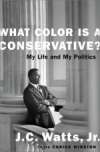 J. C. Watts' father, Buddy never went
past two days into the 7th grade, and yet despite the economic obstacles he
faced, his dynamism never failed. Buddy Watts was a Democrat who voted
Republican. He taught J. C. "The only helping hand you can count on
is the one at the end of your sleeve."
J. C. Watts' father, Buddy never went
past two days into the 7th grade, and yet despite the economic obstacles he
faced, his dynamism never failed. Buddy Watts was a Democrat who voted
Republican. He taught J. C. "The only helping hand you can count on
is the one at the end of your sleeve."
The book, What Color Is A
Conservative?, (HarperCollins, 320 pages) written by J. C. Watts, Jr. with
Chriss Winston, tells how football changed his life, how he and his wife
rediscovered their faith and how he came to discover that he was a
Republican. He tells about his running for Congress and his distress with
the politics of victimhood. He believes that good will always be
stronger than evil; perseverance is its own reward.
Return to Index
OCTOBER
2002
 LIBERALISM
MUST BE STOPPED
LIBERALISM
MUST BE STOPPED
Liberalism isn't just wrong, says Sean
Hannity: it could destroy America. He appears on Fox News Channel's
Hannity and Colmes and on syndicated radio. Now he wrote a book.
Hannity pulls no punches in Let
Freedom Ring: Winning the War of Liberty over Liberalism, (Regan Books, 288
pages) declaring that if the Left prevails in American the well-being of future
generations will be in peril. He doesn't just explain why the liberal take
on these issues is wrong -- he challenges liberal arguments head-on, exposing
their fallacies and giving you clear, hard-to-refute comebacks you can use with
liberals.
According to Dr. James C. Dobson,
"Hannity consistently penetrates to the heart of important cultural issues,
staking out positions clearly supportive of moral and traditional values.
He's continuing to articulate and bravely defend American family
principles. Sean is to be commended, admired -- and watched!"
Return to Index
SEPTEMBER
2002
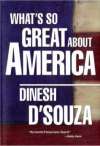 AMERICAN
CHEERLEADER
AMERICAN
CHEERLEADER
Dinesh D'Souza, an immigrant from
India, takes on America's critics, both abroad and at home. While those on
the political Left blame America for every ill in the world -- and teach in
schools that Western and American culture is no better than, and probably worse
than, Third World cultures, he disagrees.
In What's So Great About America
(Regnery, 256 pages), D'Souza debunks the myths of the Left. He believes a
clear understanding of the moral basis of Western civilization is needed now
more than ever. His book offers a powerful defense for America and exposes
the truth about who our enemies really are.
Return to Index
AUGUST
2002
 WAR
LETTERS
WAR
LETTERS
In War Letters, edited by Andrew
Carroll, (Scribner, 491 pages) previously-unpublished letters from the Civil
War, World War I, World War II, Korea, Vietnam, the Persian Gulf and Bosnia
offer unprecedented insight into the experiences of those who have served this
nation in times of war.
There are dramatic accounts of combat,
poignant declarations of love, humorous anecdotes, inspiring expression of
patriotism and thoughtful reflections on the nature of warfare by American
soldiers, marines, airmen, sailors, nurses, medics and chaplains. Each
correspondence is introduced by a brief summary detailing who the letter writer
is, the circumstances under which the letter is being written, and, in many
cases, the fate of the letter writer.
War Letters is a lasting tribute
to those who have fought for this country, and a celebration of the
enduring power and lyricism of personal letters.
Return to Index
JULY
2002
 THOUGHT
POLICE
THOUGHT
POLICE
Tammy Bruce, former president of the
National Organization for Women's Los Angeles chapter and a former member of the
group's national board, has written an insider's account of how the American
left has engaged in a deliberate effort to control society through the creation
and enforcement of rigid rules governing speech and behavior. In The
New Thought Police (Prima Publishing, 300 pages), Bruce explains how freedom
of expression and thought have been deliberately suppressed in pursuit of power.
"As the organized Left gained
cultural power, it turned into a monster that found perpetual victimhood,
combined with thought and speech control, the most efficient way to hold onto
power," she writes in the introduction. "Suddenly it was the
Left, the protector of liberty, that was setting rules about what could and
could not be said, or even thought. And because we do not give up our
freedom willingly, the strategy of the left-wing establishment has become one of
intimidation, backed up by legal force."
This is a highly readable book which
gives the inside story.
Return to Index
MAY 2002
 WAS FRANKLIN THE KEY?
WAS FRANKLIN THE KEY?
In a new biography of Benjamin
Franklin, Franklin: The Essential Founding Father (Regnery, 450 pages), James Srodes argues that Franklin was the one who forged the
compromises and crafted the alliances that allowed this country to be born.
This is a fascinating study of a man of
ceaseless energies and remarkable accomplishments -- a scientist, diplomat,
tradesman, author, inventor, celebrated wit, spymaster, propagandist, military
leader, quartermaster. The book is a colorful, insightful, and fun read.
Return to Index
APRIL
2002
 THE
REVOLUTIONS
THE
REVOLUTIONS
Susan Dunn, in Sister Revolutions:
French Lightning, American Light, (Faber & Faber, 256 pages) adds a
well-written, lively narrative history, comparing the American and French
Revolutions. While exploring the characters of such participants as George
Washington and Robespierre, she contrasts the attitudes of the participants.
In her view, the American Revolution
emphasized personal freedom, while the French concluded that personal freedom
was less important than consensus, public order and economic democracy.
Her analysis shows how the differences in the American Bill of Rights and the
French Declaration of the Rights of Man affected events in later years on both
sides of the Atlantic.
Return to Index
MARCH
2002
 WHO
IS BJORN LOMBORG?
WHO
IS BJORN LOMBORG?
Recently, a number of conservative
publications have featured articles on the Danish professor of statistics and a
self-professed "old left-wing Greenpeace member." Stories have
appeared in the December 24, 2001 Weekly Standard, the January 14-20,
2002 issue of The Washington Times, National Weekly Edition, the January
20, 2002 telegraph.co.uk, (the internet version of the London
Telegraph), and the January 22, 2002 edition of Reason Magazine.
He stumbled upon an article by the
American economist Julian Simon; it stated that the doomsday prophets, were,
simply wrong. He gathered some of his best students and set out to prove
that Mr. Simon was no more than a right-wing propagandist. They discovered
that real data proved him to be correct.
In The Skeptical Environmentalist:
Measuring the Real State of the World, (Cambridge University Press, 540
pages), he sets out what he calls the Litany of the activists:
"Our resources are running
out. The population is ever growing, leaving less and less to eat.
The air and water are becoming ever more polluted. The planet's species
are becoming extinct in vast numbers -- we kill off more than 40,000 each
year. The forests are disappearing, fish stocks are collapsing and the
coral reefs are dying.
"We are defiling our earth, the
fertile topsoil is disappearing, we are paving over nature, destroying the
wilderness, decimating the biosphere, and will end up killing ourselves in the
process. The world's ecosystem is breaking down. We are fast
approaching the absolute limit of viability, and the limits of growth are
becoming apparent."
In fact, our resources are more
plentiful than ever, and likely to become more so; the atmosphere is cleaner
than it has been for centuries; population growth is not out of control, is
slowing down in the developed world, and is likely to slow in the undeveloped
world as it becomes more prosperous; the figure of 40,00 species killed off is
ludicrously overstated; species have always become extinct, and the process has
not accelerated to a dangerous degree.
The ecosystem is not breaking
down. Mr. Lomborg answers the stoked-up panic about CO2
(greenhouse gas) emissions, he points out that, far from creating deserts and
destroying mankind's food supply, carbon dioxide actually works as a fertilizer,
improving conditions for the growth of rice and wheat -- an effect enhanced by
higher temperatures. Dire prediction of meteorological catastrophe in a
warmer world are simply not borne out by the data.
Vast sums are due to be spent on
combating global warming. But, says Lomborg: "We can help the
developing world so much better by doing other things, like giving them clean
drinking water and proper sanitation.
"For $200 billion -- which is the
cost of implementing the Kyoto Agreement [in which industrial nations pledged to
cut their emissions of greenhouse gases] for one year -- you could permanently
provide clean drinking water for everyone. That would save two million
people dying and half a billion people becoming seriously ill every year."
And, keep in mind, as the extremists
worry about the melting of the Antarctic ice, scientists have actually measured
it and its getting thicker.
Return to Index
FEBRUARY
2002
 ROBERT
HANSSEN -- TRAITOR
ROBERT
HANSSEN -- TRAITOR
Pulitzer Prize-winning reporter, David
A. Vise, tells the story of Robert Hanssen and the FBI. In The Bureau
and the Mole: The Unmasking of Robert Philip Hanssen, the Most Dangerous Double
Agent in FBI History, (Atlantic Monthly Press, 352 pages) he documents how
Hanssen's brother-in-law, also an FBI agent, attempted to turn Hanssen in more
than 10 years earlier than he was caught.
The appendix lays out the secrets that
were available to Hanssen as well as the ones he sold to the Russians. It
also contains e-mails and internet postings which Hanssen sent. They
uncover the incredible double life he led and lead one to wonder how inept the
FBI is in failing to uncover him for all those years.
Return to Index
JANUARY
2002
 WEINBERGER
SPEAKS
WEINBERGER
SPEAKS
In the Arena: A Memoir of the 20th
Century, (Regnery) by Caspar W. Weinberger with Gretchen Roberts is a
remarkably straightforward, modest, and generally earnest account of his life
through the last 80 plus years of the 20th century.
It follows him from his birth in San
Francisco in 1917 through school, college, World War II, law school, and,
finally, into California politics. It follows his career with Richard
Nixon, Ronald Reagan and George Herbert Walker Bush.
The book is a robustly political
memoir, and one that is personal and personable. The image of Caspar
Weinberger is one of an intelligent, warm, modest, even-tempered man with a
schoolboy's sense of wonder.
Return to Index
DECEMBER
2001
 A
LOOK BACK AT REAGAN
A
LOOK BACK AT REAGAN
In her latest book, When Character
Was King (Viking, 224 pages), Peggy Noonan argues that the reason for Ronald
Reagan's success was no secret at all. It was his character -- his
courage, his kindness, his persistence, his honesty, and his almost heroic
patience in the face of setbacks -- that was the most important element of his
success.
Noonan was a special assistant to
President Ronald Reagan from 1984 to 1986; she discloses never-before-told
stories from the former president's family, friends, and White House colleagues
to reveal the true nature of a man even his opponents now view as a maker of
history.
Return to Index
NOVEMBER
2001
 R.I.P.
BARBARA OLSON
R.I.P.
BARBARA OLSON
Barbara Olson died on September 11,
2001. The wife of Solicitor General Ted Olson, who argued the case of Bush
vs. Gore in the Supreme Court, she was standing in the back of an airplane with
the Captain of a high-jacked airliner on her cell phone. She had called
her husband to advise him of the high-jacking and that the terrorists had used
knives and box-cutters to perpetrate the deed. She was attempting to learn
if there was anything they could do when the line went dead as the plane crashed
into the Pentagon.
This bright, pretty, 45-year old
attorney had served as in the Department of Justice, as a congressional
investigator, and as a general counsel in the United States Senate. After
having been involved in the investigation of "Travelgate," she became
convinced that all roads in many of the scandals afflicting the Clinton
administration led to Hillary Clinton. She, therefore, researched and
wrote a revealing book about Hillary, documenting her many connections to
various marxist, socialist causes and her obvious sympathies in that
direction. Predicting that Hillary will eventually pursue the Presidency
in her endless quest for money and power, she exposed her
 ambitions in Hell
To Pay (Regnery, 344 pages). While not a literary masterpiece, it is a
fascinating, quick read which should be studied by anyone thinking of voting for
the former First Lady.
ambitions in Hell
To Pay (Regnery, 344 pages). While not a literary masterpiece, it is a
fascinating, quick read which should be studied by anyone thinking of voting for
the former First Lady.
At the time of her death, her second
book, The Final Days: The Last, Desperate Abuses of Power by the Clinton
White House, (Regnery, 258 pages) was just about to be released. It
will not be delayed. It covers the full story of the pardons, Bill and
Hillary's eleventh hour raids on taxpayer dollars, private property, individual
liberties, and even justice itself. It promises to be as good as her
first.
Return to Index
OCTOBER
2001
 ANOTHER
LOOK AT JOE McCARTHY
ANOTHER
LOOK AT JOE McCARTHY
In The Redhunter: A Novel Based on
the Life of Senator Joe McCarthy (Little Brown & Company, 421 pages),
William F. Buckley Jr. revisits the life of the Senator placing him in the
historical context of his times. Buckley does not present him as a man
without fault, but does offer an entertaining and eye-opening account of his
rise and fall, complete with media frenzy, senate hearings and back-room
maneuverings.
The very real threat posed by the
Communist infiltration of our government is brought home, and the essential
morality of McCarthy in exposing this fact is also brought home in a page-turner
which will capture you.
Return to Index
SEPTEMBER
2001
 AN
OLDIE BUT GOODIE
AN
OLDIE BUT GOODIE
This book,
originally published in 1944, was republished in a 50th anniversary edition by
the University of Chicago Press (274 pages). Friedrich A. Hayek was one of
the first economists of the Austrian school. He later went to the
University of Chicago where he met Milton A. Friedman, who wrote the
introduction to this edition.
He
discusses individualism and collectivism, economic control and totalitarianism,
and the socialist roots of Naziism. He showed the ultimate consequences of
power in the hands who believe that they, rather than the individual, know what
is best for all people. Hayek, a Nobel Laureate in economics, was one of
the most influential economists ever. Time has proved him right.
Return to Index
AUGUST
2001
 SPIRITED
AMERICANS
SPIRITED
AMERICANS
America is recognizing that an entire
generation knows little about the Constitution, the Founding Fathers, or what
sets the United States apart from the other nations of the world.
Attempting to correct this failing, A. E. Jeffcoat has written "Spirited
Americans: A Commentary on America's Optimists" which offers a timely
account of what makes America unique in the history of mankind.
Recommended by the Heritage Foundation,
the book reminds "us of what America used to be like before the cultural
rot set in, and what it can still be again, when the spirit moves it,"
according to Joseph Shattan, writing in the Wall Street Journal.
Return to Index
JULY
2001
 THE
LITTLE "RED" SCHOOLHOUSE
THE
LITTLE "RED" SCHOOLHOUSE
Ronald Radosh, the scholar who is
probably most responsible for showing that Julius Rosenberg was indeed a spy for
the Soviet Union, gives us a humorous and frank look at his life as a "red
diaper" baby in New York. He describes being sent to summer camp to
become a good little Communist, going to the Little Red Schoolhouse -- a
Communist Party private school, his adventures at college in Wisconsin and trips
around the world. In Commies: A Journey Through the Old Left, New Left
and the Leftover Left (Encounter Books, 238 pages) he describes his voyage
from true believer to skeptic to heretic to his former fellow
travelers.
The New York Times Magazine says
"Radosh riles the remnants of left far more than any conservative
scholar."
Return to Index
JUNE
2001
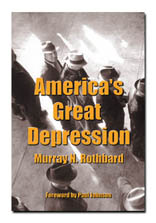 THE
TRUTH ABOUT THE DEPRESSION
THE
TRUTH ABOUT THE DEPRESSION
According to Franklin Roosevelt, John
Maynard Keynes and the Brain Trust, the Great Depression of the 1930s was caused
by laissez-faire capitalism and the princes of privilege. The New Deal
writers saw to it that the myth lived. For a generation it was scarcely
questioned.
Then, in 1963, along came Murray
Rothbard to challenge every popular assumption about the Depression.
Analyzing the Depression according to the insights of the Austrian school
of economics, he found that the collapse had its roots in the Twenties, and that
"moderate" conservative Herbert Hoover made things worse. In
both cases the villain was government intervention. Back in its fifth
edition, America's Great Depression, (Ludvig von Mises Institute, 368
pages) Rothbard shows why his mentor, von Mises was the only economist to
foresee the coming of the Great Depression. He places the blame squarely
on misguided government intervention, especially by the central bank.
Return to Index
MAY
2001
 A
FASCINATING STORY
A
FASCINATING STORY
While Thomas Sowell is known for his
politically incorrect columns and his knowledge of economics, in his book, A
Personal Odyssey, (Free Press, 320 pages) he tells of his journey from
fatherless boy to his PhD. He details his experiences in the U.S.
Marines, at Howard and Harvard Universities to his fellowship at Stanford's
Hoover Institute.
His disdain for the modern academy
dates back to his earliest years in college. His story is that of a
genuinely courageous man of integrity and a fine scholar.
Return to Index
APRIL
2001
 AMIABLE
DUNCE?
AMIABLE
DUNCE?
Much to the consternation of the main
stream press who thought President Ronald Reagan was lucky to find his way home
at night, a treasure trove of his private papers discovered in 1998 has proved
otherwise. In Reagan, In His Own Hand, (Free Press, 576 pages)
three editors, Kiron K. Skinner, Annelise Anderson and Martin Anderson, have
reproduced these papers in typewritten (and in some cases facsimile) form including spelling
errors, insertions and deletions.
The previously undiscovered writings
escaped Reagan's habit of throwing away the handwritten drafts when the final
speech was typed. Many of them come from 5-minute five-a-week radio spots
he broadcast in the 1970's between his stint as Governor of California and the
Presidency. They cover every subject which was an issue at the time and
show without a doubt that Ronald Reagan's greatness was not an accident.
Return to Index
MARCH
2001
 WHERE
BRITAIN WENT WRONG
WHERE
BRITAIN WENT WRONG
Peter Hitchens, the conservative
brother of self-described Marxist Christopher Hitchens, managed to produce a
surprise best-seller in Britain despite the difficulties he had in getting the
book published where publishers are even more hostile to conservatives than in
the USA.
In The Abolition of Britain: From
Winston Churchill to Princess Diana (Encounter Books, 332 pages) he
describes how new Britain has changed. Despite being the cradle of
parliamentary democracy and the source of the Magna Carta, many of their
personal liberties are under threat. Jury trials are something the Labor
Party would like to limit and eventually get rid of. The moves to
consolidate more closely with the European Union threaten many of the liberties
which Americans and the British have taken for granted for centuries.
He suggests that Britain imported from
America the worst characteristics of American society and is suffering mightily
for doing so. A very provocative read.
Return to Index
FEBRUARY
2001
 BETTER
ALL THE TIME
BETTER
ALL THE TIME
According to economists Stephen Moore
and the late Dr. Julian Simon (who died in 1998 after completing an
initial draft of the book), the trend in America is still one of staggering
progress in every material measurement of well being for every class,
demographic and racial group. It was outside the purview of the book to
examine issue of the state of America's cultural and moral well-being.
The book, It's Getting Better All
the Time, (Cato Institute, 294 pages) analyzes such issues as life
expectancy, health care, working conditions, civil rights, housing,
transportation, food, recreation and leisure time and finds that in the last 100
years conditions improved astonishingly. This is all the more amazing
considering that progress in those areas was virtually at a standstill for the
previous 1,000 years. They attribute the success to political and economic
freedom that produces innovation and advancement and confidently predict that in
the years and century ahead we will consistently be able to say "it's
getting better all the time."
Return to Index
JANUARY
2001
 ANOTHER
LOOK AT POLITICAL CORRECTNESS
ANOTHER
LOOK AT POLITICAL CORRECTNESS
Alan Charles Kors and Harvey A.
Silverglate are hard-core civil libertarians who object to the "hidden,
systematic assault upon liberty, individualism, dignity, due process, and
equality before the law" which is rampant on today's campuses. In The
Shadow University (Free Press, 320 pages) they show how the modern
university "hands students a moral agenda upon arrival, subjects them to
mandatory political reeducation, sends them to sensitivity training, submerges
their individuality in official group identity, intrudes upon private
conscience, treats them with scandalous inequality, and when it chooses,
suspends or expels them."
Return to Index
DECEMBER
2000
 A
LOOK A POLITICAL CORRECTNESS
A
LOOK A POLITICAL CORRECTNESS
A black radio talk show host who considers himself a
libertarian, Larry Elder has written a best-selling book, The Ten Things You
Can't Say in America (St. Martins Press, 352 pages) which attacks the
politically correct, black leaders, feminists, gun-control advocates and other
liberals. His views are controversial, but raise issues that he feels
should be discussed, such as black racism, the "glass ceiling," and
the war on drugs. Like other blacks who oppose the views of the
left-liberal spokesmen, such as Jesse Jackson, he has been attacked as an
"Oreo" or "Uncle Tom." He has written a very readable
book which has drawn excellent reviews.
Return to Index
NOVEMBER
2000
 LIBERALISM'S
TRAGIC CONSEQUENCES
LIBERALISM'S
TRAGIC CONSEQUENCES
Myron Magnet's original printing of
this book was instrumental to George W. Bush's ideas about "compassionate
conservatism." It has been reprinted, The Dream and the Nightmare,
(Encounter Books, 256 pages) with a new introduction.
Magnet was the typical 1960's-1970's
liberal who has seen the error of his ways. He analyzes the effect of the
"if it feels good, do it" generation on the culture of today and
concludes the consequences have been tragic, particularly for the poor and the
underclasses. His analysis shows how the liberal social policies have now
become the mainstream and continue to produce unfortunate results.
Conservatives have now become the radicals shaking up the system.
Return to Index
OCTOBER
2000
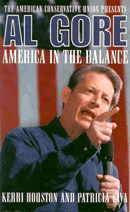 AMERICA IN THE BALANCE
AMERICA IN THE BALANCE
In a small, but powerful, book written by Kerri Houston and Patricia Fava
document the truth about the stands that Al Gore has taken throughout his public
life. In Al Gore: America in the Balance the extreme agenda Gore supports
is documented, in many cases, in his own words. While the mainstream media
portrays Gore as a moderate Boy Scout, the truth about his character,
environmentalist stand, position on taxes and education show him to be a
dedicated man of the left. He strongly favors redistributive policies which take
from people who work and pay taxes and give to those who do not. Like most other
limousine liberals, however, he believes that "some pigs are more equal
than others." When it comes to his special friends and fund-raisers (and
his own personal interests) your tax dollars have found a new home. He truly
believes that an elite class (of which he is one) should determine the winners
and the losers. His stands on gun control -- take guns away from private
citizens -- and the military -- kill it with kindness and weaken American power
-- will enable the imposition of a Soccialist state on America.
The book, 92 pages including notes, is available from the American
Conservative Union at P.O. Box 738, Ottawa, IL 61350 for $3.95 including
shipping and handling. For bulk purchases or further information, call toll
free, 800-426-1357.
Return to Index
SEPTEMBER
2000
 WAS
THIS A TRIBE?
WAS
THIS A TRIBE?
Jeff Benedict, an investigative
journalist and attorney explored the history of the recognition and subsequent
treatment of the Mashantucket Pequot Tribe in Ledyard, Connecticutt, in Without
Reservation: The Making of America's Most Powerful Indian Tribe and Foxwoods,
the World's Largest Casino (Harpercollins, 384 pages).
This book explores how a crusading
lawyer, Tom Tureen, found a man by the name of Skip Hayward (who along with his
relatives had always identified himself as "white") and artificially
established the Mashantucket Piquot "Tribe" in 1975 to take advantage
of litigation over aboriginal land claims. Hayward and 200 of his
relatives claiming tribal status had never lived together, practiced Indian
customs, knew little of Pequot history and may not have been connected to the
Pequots at all. They "distinguished themselves as the only American
Indian tribe without a single member whose professed racial origin [was] Native
American," Benedict notes.
This is a story of how this group of
people managed to use the system to create great wealth for themselves at the
expense of both the federal and state governments, and explains how this can
happen anywhere, anytime unless this country rethinks its Indian policies.
Return to Index
AUGUST
2000
 AN
INTERESTING LOOK AT GLOBALISM
AN
INTERESTING LOOK AT GLOBALISM
One day in 1992, Thomas Friedman, the
well-traveled foreign affairs columnist of the New York Times, toured a
Lexus factory in Japan and marveled at the robots that put the luxury cars
together. That evening, as he ate sushi on a Japanese bullet train, he
read a story about yet another Middle East squabble between Palestinians and
Israelis. It hit him: Half the world was lusting after those Lexuses,
or at least the technology that made them possible, and the other half was
fighting over who owned which olive tree.
In this book, he looks at globalization
from an American point of view. He talks about the Disneyfication of the
earth and developed the theory that McDonald's is important to world
peace. He says that no two countries that have McDonald's Restaurants have
ever gone to war against each other. (He excepts civil wars and internal
strife.) While the hardcover edition of The Lexus and the Olive Tree (Farrar
Straus & Giroux, 394 pages) was published in April 1999, the paperback
edition was just recently released.
Return to Index
JULY
2000
 AMERICA'S
DOUBLE AGENT
AMERICA'S
DOUBLE AGENT
David Wise tells the true story of an
American, Joseph Cassidy, who was asked in 1959 to operate as a double agent,
despite the fact that he was an ordinary army sergeant with no training in
intelligence or espionage. In his 20+ year career he passed US-approved
information about chemical and biological weapons and troop movements to the
Soviets. Part of the objective of the operation was to uncover the
Soviets' spy network, eventually uncovering 10 agents living in the United
States. Throughout his career, only Cassidy's wife knew of his activities
allowing him to retire in peace in Florida. Cassidy's Run (Random
House, 256 pages) is a true story that reads like a thriller.
Return to Index
JUNE 2000
 HISTORY
GOING DOWN EASY
HISTORY
GOING DOWN EASY
In Scandalmonger, (Simon &
Schuster, 496 pages) William Safire has explored five scandals from the 1790's
which take place over a period of ten years. While this is a historic
novel, Safire has footnoted the truth from fiction.
He explores the lives of Hamilton,
Jefferson, Madison, Adams, etc. and their foibles and failures. The title
character, James Callender, friend and supporter of Jefferson eventually turned
on him and exposed the relationship between Thomas Jefferson and Sally Hemings.
It shows that this country has survived despite the personal failures of its
leaders.
Return to Index
MAY 2000
 SAVING
THE ENVIRONMENT
SAVING
THE ENVIRONMENT
FROM THE ENVIRONMENTALISTS
A conservative engineer-attorney, Peter
Huber, indicts environmentalism as we know it in Hard Green (Basic Books,
288 pages). He argues in favor of market solutions to environmental
problems and shows that current recycling programs and their ilk are failed
strategies. He shows that garbage sorting helps nothing but the
consciences. His assertions are clear and thorough and should open eyes
across the political spectrum.
William F. Buckley, Jr. says:
"Peter Huber's brilliant exploration of the ideology of environmentalism
takes the breath away by its ingenuity, intensity, and polemical artistry.
It is the richest contribution ever made to the greening of the political
mind."
Return to Index
APRIL
2000
 TAXES
AND AMERICANS
TAXES
AND AMERICANS
Amity Shlaes, a Wall Street Journal editorial
writer, has written The Greedy Hand: How Taxes Drive Americans Crazy and What
to Do About It (Random House, 255 pages).
She
documents how the average family with two wage-earners now sends almost 40% of
its income to local, state and federal governments. "The greedy hand
of government" -- first described by American revolutionary Thomas Paine --
is greedier than ever, creating a situation ripe for tax reform, if not revolt,
Shlaes writes. She details the various types of taxes and how the system
damages the economy and hurts working people. She does provide some
prescriptions for change in the tax system and the way government spends our
money.
Return to Index
MARCH 2000
 A
LOOK INSIDE THE KGB
A
LOOK INSIDE THE KGB
In early 1992, a Russian man walked
into the British embassy in a newly independent Baltic nation and asked to speak
to someone in authority. Vasili Mitrokhin had worked as chief archivist
for the foreign-intelligence arm of the KGB and was responsible for checking and
sealing approximately 300,000 files. Having lost faith in the Communist
system, he decided to compile a record of the foreign operations of the KGB.
Every day for 12 years, he smuggled notes out of the archive and hid them in his
home. When he escaped to Britain, his archive contained tens of thousands
of pages of notes.
In 1995, Mitrokhin contacted
Christopher Andrew and the two collaborated to write The Sword and the
Shield: The Mitrokhin Archive and the Secret History of the KGB (Basic
Books, 720 pages). They name the names and reveal the worldwide network of
the KGB.
Return to Index
FEBRUARY
2000
 WHY
THE WORLD ISN'T FAIR
WHY
THE WORLD ISN'T FAIR
Since 1500, Europeans have dominated
the World and controlled the course of events. While many have asked why
this occurred, Jared Diamond, a biologist, analyzed the question from a
scientific point of view. In Guns, Germs, and Steel (W. W. Norton
& Co., 480 pages) points out that the geography of Eurasia was best suited
to farming, domestication of animals, and the free flow of information. He
reviews human history on every continent since the Ice Age at a rate that
emphasizes only the broadest movements of peoples and ideas. It is
considered a good book to accompany David S. Landes analysis from an economic
viewpoint, The Wealth and Poverty of Nations: Why Some Are So Rich and Some
So Poor (W. W. Horton & Co., 658 pages).

Landes argues that the key to today's
disparity between the rich and poor nations of the world stems directly from the
industrial revolution in which some countries made the leap to industrialization
and became fabulously rich, while other countries failed to adapt and remained
poor. He contrasts the characteristics of successfully industrial nations
-- work, thrift, honesty, patience, annd tenacity -- with those of nonindustrial
countries. Landes argues that until these values are internalized by all
nations, the gulf between the rich and poor will continue to grow.
Return to Index
JANUARY
2000
 THE
MAN WHO GAVE AMERICA LANGUAGE
THE
MAN WHO GAVE AMERICA LANGUAGE
Harlow Giles Unger, in Noah Webster: The Life and Times of
an American Patriot, (John Wiley & Sons, 400 pages) details the impact
of Noah Webster on the American scene. He was the man who wrote the first
dictionary of "American" English, and set forth an elementary school
curriculum which for 100 years was the foundation of American education.
This
was a man who never held elective office, but was a friend of Washington,
Franklin, John Adams and Madison. He advocated tirelessly for an American
language and literature independent of the British tradition. To protect
himself from piracy of his works, he campaigned successfully for copyright
legislation.
The book also relives the turbulent
history between the Revolution and the War of 1812, reminding the reader of the
precarious route our country took to the establishment of a republic.
Return to Index
DECEMBER
1999
 COMMUNISTS
IN HOLLYWOOD
COMMUNISTS
IN HOLLYWOOD
Most people have heard that the House Committee
on Un-American Activities led an organized witch hunt against writers and
actors with left-wing sympathies, creating an environment that led to a
blacklist destroying many talented people's careers.
In Hollywood Party: How Communism Seduced
the American Film Industry in the 1930s and 1940s, (Prima Publishing,
365 pages), Kenneth Lloyd Billingsley tells an engrossing tale of intrigue,
passion, betrayal and violence. He reveals how the Party -- through the
muscle and trade unionists, the intellect of celebrated writers, and the
facade of glamorous movie stars -- nearly came to dominate an industry
that was the lifeblood of American culture.
Return to Index
NOVEMBER
1999
 RULES
NOT TAUGHT IN SCHOOL
RULES
NOT TAUGHT IN SCHOOL
Charles
Sykes is the author of "Dumbing
Down Our Kids." (St. Martin's Press). In this book, Mr. Sykes
discusses how our current liberal, feel-good, politically correct society
has created a generation of children with no concept of reality, setting
them up for failure in the real world. Mr. Sykes volunteered for high school
and college graduates a list of things he did not learn in school.
1. Life is not fair; get used to it.
2. The world won't care about your self-esteem.
The world will expect you to accomplish something before you feel good
about yourself.
3. You will not make 40 thousand dollars a
year right out of high school. You won't be a vice president with a car
phone until you earn both.
4. If you think your teacher is tough, wait
till you get a boss. He doesn't have tenure.
5. Flipping burgers is not beneath your dignity.
Your grandparents had a different word for burger flipping; they called
it opportunity.
6. If you screw up, it's not your parents'
fault so don't whine about your mistakes. Learn from them.
7. Before you were born, your parents weren't
as "boring" as they are now. They got that way paying your bills,
cleaning your room, and listening to you tell them how idealistic you are.
So before you save the rain forest from the blood-sucking parasites of
your parents' generation, try delousing the closet in your own room first.
8. Your school may have done away with winners
and losers but life has not. In some schools failing grades have been abolished,
you may have as many attempts as you want to get the right answer. This,
of course, bears not the slightest resemblance to anything in real life.
9. Life is not divided into semesters. You
don't get summers off, and very few employers are interested in helping
you find yourself. Do that on your own time.
10. Television is not real life. The real life
people actually have to leave the coffee shop and go to jobs.
11. Be nice to nerds. Chances are you'll end
up working for one.
Return to Index
OCTOBER
1999
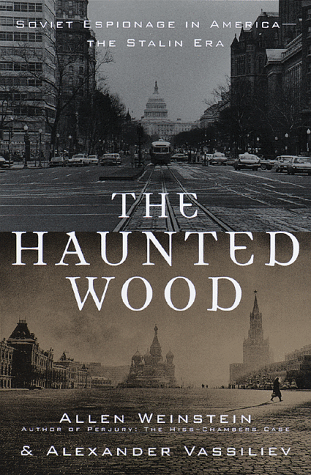 SOVIET
ESPIONAGE IN AMERICA --
SOVIET
ESPIONAGE IN AMERICA --
THE STALIN ERA
This joint effort between Allen Weinstein (author
of a highly regarded history of the Hiss-Chambers case, Perjury)
and Alexander Vassiliev (a KGB agent turned journalist) documents many
American leftists who were caught in the Soviet orbit -- many of whom were
top government officials, including a Congressman from New York, a close
advisor to President Roosevelt and an American Ambassador's daughter.
The Haunted Wood (Random House, 400
pages) was written using both American sources and Soviet archives to which
the authors were given special access.
Using these records, the authors provide definitive
evidence documenting the clandestine work of 58 American agents, including
Hiss and the Rosenbergs, who worked for the NKVD (later the KGB) or its
sister services. It is no longer arguable that Nixon was right.
Return to Index
SEPTEMBER 1999
THE INTERNET?
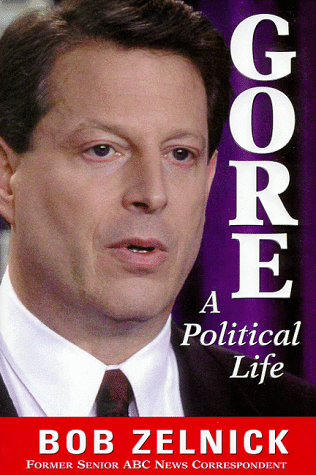 GORE INVENTED HIMSELF!
GORE INVENTED HIMSELF!
Bob Zelnick lost his job at ABC when
he would not agree NOT to write this book.
Gore: A Political Life (Regnery,
380 pages) introduces America to the real Al Gore -- from his
priveleged upbringing living in a hotel suite on Embassy Row and
attendance at prestigious St. Alban's School in Washington. After
finally making the football team, he was ejected from two games
for "unsportsmanlike conduct."
At Harvard, Gore and his future wife,
Tipper, become recreational marijuana smokers, a practice which
they only gave up 10 years later when Al decided to run for
office. It documents Gore's inability to truthfully discuss his
Army career and later stint as a journalist.
Human Events, in
commenting on this book, says:
- Discover Al Gore's America --
where central planners tell you what to buy and how to
live. If the phrase "radical environmental
socialism" sends a shiver of fear down your spine,
you MUST read this book.
Return to Index
AUGUST 1999
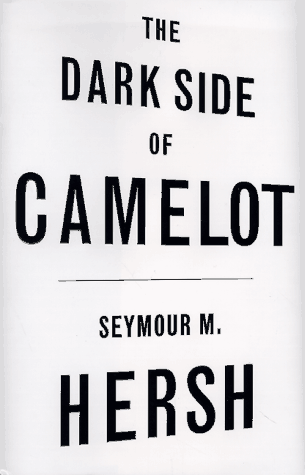 CLINTON IS A LOT MORE LIKE HIS
CLINTON IS A LOT MORE LIKE HIS
HERO THAN MOST PEOPLE KNOW
When liberal, Pulitzer Prize-winning
investigative journalist, Seymour M. Hersh, first released this
book a couple of years ago, he was unprepared for the public
reaction.
All of the critics focused on the
(later disclosed) false Marilyn Monroe papers and ignored the
rest of the revelations. In the paperback edition, released last
year, those references have been omitted. However, the rest of
the book is based upon interviews with former Kennedy
administration officials, former secret service agents, and
hundreds of Kennedy's personal friends and associates.
The book documents the lengths to
which the Kennedy family went to buy not only the 1960 election,
but prior elections as well. It documents the ties between the
Kennedys and organized crime. It documents Kennedy's many
liaisons with prostitutes and mistresses and shows how his
actions amounted to not only minor abuses of power -- but also
how they threatened the security of the nation and the integrity
of the office. It documents how Robert F. Kennedy attempted to
cover up all evidence of these activities after the assassination
of John Kennedy.
If you are not willing to learn the
truth about the Kennedy family, don't read this book.
Return to Index
JULY
1999
 AN AX MURDERER IN OUR MIDST
AN AX MURDERER IN OUR MIDST
The front page of the Life! section
of The Bay City Times featured an article by
Eric English on a new book which chronicles the life of an
accused ax murderer. The book tells the story of Henry B.
Farrington, a likable jeweler, counterfeiter and notorious
gambler. In 1875 he was tried in Bay City for the ax murder of
William Steward, a wholesale liquor dealer whose body was
discovered one October morning on the boardwalk of the then
wide-open town of Au Sable.
The book, 1875 Murder in Au
Sable -- The Sorry Life and Times of Henry B. Farrington
was "compiled" by Fred Glass and Patricia Sherman and
was illustrated by of our own members, Mary Jane Hennigar. It was
published by the Au Sable-Oscoda Historical Society and is
available for $15.00 at the Great Northern Bookstore in Oscoda or
by writing to the Au Sable-Oscoda Historical Society, P.O. Box
679, Oscoda, Michigan 48750. There is a $3.50 shipping charge for
books ordered by mail.
Return to Index
JUNE 1999
 MORE
GUNS, LESS CRIME
MORE
GUNS, LESS CRIME
John R. Lott, Jr. set off a heated
public debate in January 1997 Journal of Legal Studies
showing that concealed-carry weapons permits reduced rates of
violent crime. In his updated study, More Guns, Less
Crime: Understanding Crime and Gun-Control Laws (Studies in Law
and Economics) published by the University of Chicago
Press (236 pages) he provides additional evidence and responds to
his critics.
Mr. Lott teaches criminal deterrence
and law and economics at the University of Chicago Law School,
where he is the Jphn M. Olin Visiting Law and Economics Fellow.
He was the chief economist at the United States Sentencing
Commission during 1988 and 1989. He has published over 70
articles in academic journals.
In general, his study shows that in
those areas where concealed-carry handgun permits have been
allowed, the rates of violent crime have consistently been
reduced as criminals have tended to avoid those crimes which
might bring them in contact with armed citizens, such as rape and
armed assault. This is not necessarily true for
non-confrontational crimes (such as breaking and entering an
unoccupied building) or in those areas adjacent to the
concealed-carry laws exist. He attributes this to criminals, in
essence, chosing easier pickings, places where citizens are not
apt to be armed or where they will not confront anyone.
It is interesting that in countering
the arguments of his critics, he consistently had his attackers
hang up the phone on him without substantiating their claims --
could it be that he is correct?
Return to Index
MAY 1999
 THINGS
ARE A WHOLE LOT
THINGS
ARE A WHOLE LOT
BETTER THAN THEY SEEM
W. Michael Cox, a Federal Reserve
economist and advisor to the Cato Institute, and Richard Alm,
business reporter from the Dallas Morning News analyze the
present economy from a different point of view. In Myths
of Rich & Poor, (256 pages, published by Basic
Books) they relate present living standards and the present
economy to that of the past by comparing the number of hours a
person must work to acquire the necessities and luxuries of life.
While conceding that there are,
indeed, some persons who have been left at the dock, that number
is very small. On the whole, the rich are richer and the poor are
richer than they have been at any other time in history. In fact,
on the basis of today's standards, many "Baby Boomers"
who grew up in middle class neighborhoods would be considered to
be in poverty today.
Using statistics which are available
from published sources, including the U.S. government, they argue
persuasively that we've never had it so good.
Return to Index
APRIL 1999
 THE
BOISTEROUS SEA OF LIBERTY
THE
BOISTEROUS SEA OF LIBERTY
This book is a collection of original
documents from American history from discovery by Christopher
Columbus through the Civil War. It was edited by David Brion
Davis and Steven Mintz, professors of history from Yale and the
University of Houston, respectively and published by Oxford
University Press.
It includes documents as diverse as a
letter from Columbus to the sovereigns on his first voyage,
records of Salem Witchcraft, documents of the American
Revolution, letters from the Founding Fathers in which they
specify the errors of each other's thinking, and those documents
which deal with America's expansion across the continent. It ends
with the Civil War heading toward Reconstruction.
Most of the documents are from the
Gilder Lehrman Collection of American history at the Pierpont
Morgan Library in New York and are part of an extensive
collection of American documents, letters, manuscripts, prints
and photographs available for scholarly and educational purposes
at the Pierpont Morgan Library.
Return to Index
MARCH 1999
 A
TREAT ON ECONOMICS
A
TREAT ON ECONOMICS
P.J. O'Rourke is a conservative,
prosperous, American journalist who decided to take a trip around
the world and compare various market systems and why they do or
do not work. In his Eat the Rich, A Treatise on
Economics, (320 pages, Publishers' Group West), P.J.
O'Rourke is at his humerous best. He compares economic systems as
diverse as Cuba, Sweden, Russia, Hong Kong and Wall Street and
with a series of anecdotes about his adventures draws some
telling insights about those features which make systems work and
those that create problems. This book is a fun read whether you
agree with Mr. O'Rourke's politics or not.
Return to Index
FEBRUARY 1999
 YEAR
OF THE RAT
YEAR
OF THE RAT
Edward Timperlake and William C.
Triplett II, both veteran congressional investigators have
detailed the sources of illegal Chinese money supplied to the
Clinton-Gore campaigns in Year of the Rat: How Bill
Clinton Compromised U.S. Security. This book
(published by Regnery) in 256 pages goes beyond the Senate and
House hearings, connects all the players and places, and
convincingly shows how the Clinton-China connection threatens
American security.
Using new information, recently
unclassified documents, undercover techniques, and interviews
with dozens of witnesses, it also raises questions about Chinese
activities on Wall Street and takes a systematic look at how the
Chinese acquire U.S. military intelligence.
The book details the role of John
Huang in raising money for the Democratic National Committee --
$2.8 million in illegal contributions which eventually had to be
returned. It establishes the connections of Huang with the Riady
family, a powerful family of Indonesian businessmen with close
ties to the Communist Chinese government and with Bill Clinton
which ultimately led to Huang getting clearance to classified
documents. This clearance was maintained even after Huang left
the Commerce Department and went to work for the DNC raising the
millions in illegal contributions.
Return to Index
OCTOBER 1998
 ARE
DEMOCRATS SOCIALISTS?
ARE
DEMOCRATS SOCIALISTS?
In the summer issue of Rising Tide,
the RNC magazine, Jim Nicholson features an article by Balint
Vazsonyi (BAH-lint VAH-zhon-yee) which raises serious issues
about the direction in which this country is heading. Mr.
Vazsonyi, a concert pianist, journalist, author, was born in
Hungary and had the dubious distinction of living under both the
Nazis and the Soviets before he came to this country in 1959. His
recent book, America's Thirty Years War: Who is
Winning? (Regnery Publishing) deals with his life
experiences which seriously raise the question of whether
"liberalism" or "progressivism" are just
other names for socialism.
He documents how America's founding
principles of rule of law, individual rights, guarantee of
private property rights, and a common American identity are being
gradually replaced by government mandated group rights,
redistribution and multi-culturalism.
In the European model, in contrast,
intellectuals essentially teach that man can create utopia, in
which everybody would be equal, but what they mean is that
everybody would be the same. This is exemplified by Vazsonyi's
observations when he first arrived in the U.S. He states:
- In Europe, people looked across
the fence and thought "Why does he have more than I
do? If I don't have that, he should not have it
either." In America, people think, "If he has
it, I can have it too, if I just work harder."
In the past thirty years,
well-meaning people, in an effort to rectify some of America's
problems have looked to the Europen models which always divide
humanity into groups, oppressors and oppressed, exploiters and
exploited, Jews and Aryans. One group is pitted against the
other; one is "bad", one is "good". The
"good" groups are taught that it is alright to hate the
"bad" groups or anyone who disagrees with them.
To accomplish the noble socialistic
goals, an increasing number of laws are passed which restrict
individual freedoms to achieve "social justice" --
everyone ends up with the same slice of the pie regardless of
ability or effort. This results in destruction of property rights
so that redistribution is possible.
Vazsonyi believes that it is not too
late to save America from the Socialist dream, but one of the
first steps is stop the linguistic double-talk and call the
"liberal" and "progressive" Democrats the
Socialists they are. The debate can then honestly take place
between the two possible futures America can have -- and let the
year 2000 be the year for choice -- Socialism or Freedom?
To read the entire article go to the
website: http://www.founding.org/risingtide.html or call the RNC Radio Hotline: (202) 863-8550.
Return to Index








Revised:
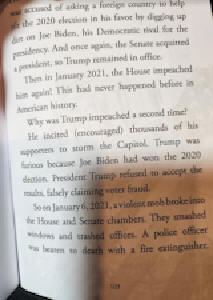 I’m certain that
garden-variety illegal fraud, combined with the legal fraud of ballot harvesting
and mail-in voting, went a long way to explain how Americans suffering terribly
in a bad economy did not deliver a wipeout to the Dems in the 2022 midterms. I
also reserve a great deal of blame for the GOP, which is trying hard to drive
MAGA from its ranks and is willing to lose to do so. But one cannot get past the
fact that the American population, after 60 years of leftist education, may be
incapable of connecting cause and effect. That brainwashing is everywhere,
including ostensibly non-fiction educational material for the 8-12-year-old set.
I’m certain that
garden-variety illegal fraud, combined with the legal fraud of ballot harvesting
and mail-in voting, went a long way to explain how Americans suffering terribly
in a bad economy did not deliver a wipeout to the Dems in the 2022 midterms. I
also reserve a great deal of blame for the GOP, which is trying hard to drive
MAGA from its ranks and is willing to lose to do so. But one cannot get past the
fact that the American population, after 60 years of leftist education, may be
incapable of connecting cause and effect. That brainwashing is everywhere,
including ostensibly non-fiction educational material for the 8-12-year-old set. Victor Davis
Hanson is one of the most respected historian/intellectuals of the
conservative movement; I have been an enthusiast of his work going back to my
first experience with his erudition and eloquence—The
Western Way of War (1989, 2nd ed. 2000), an explanation of why citizen
soldiers are so effective and why Western Armies have been so lethal. Now he
is past 24 books and hundreds if not thousands of essays as well as
appearances regularly on TV that all provide sober, thought-provoking and
insightful political commentary. Any observer of VDH cannot help but be
impressed with his solid and thoughtful analysis of political and social
issues, probative and measured.
Victor Davis
Hanson is one of the most respected historian/intellectuals of the
conservative movement; I have been an enthusiast of his work going back to my
first experience with his erudition and eloquence—The
Western Way of War (1989, 2nd ed. 2000), an explanation of why citizen
soldiers are so effective and why Western Armies have been so lethal. Now he
is past 24 books and hundreds if not thousands of essays as well as
appearances regularly on TV that all provide sober, thought-provoking and
insightful political commentary. Any observer of VDH cannot help but be
impressed with his solid and thoughtful analysis of political and social
issues, probative and measured.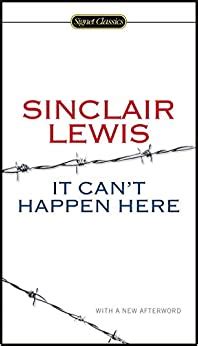 Sinclair Lewis's novel of
1935, It Can't Happen Here, was published amid the rise of fascism in Europe.
The book is about the political career of fictional Buzz Windrip, who is elected
president in 1936, defeating FDR with a campaign promising a return to
traditional values and drastic social and economic reforms (he promises every
American $5K). Once elected, he becomes a totalitarian tyrant, complete with his
own paramilitary force called the Minute Men!
Sinclair Lewis's novel of
1935, It Can't Happen Here, was published amid the rise of fascism in Europe.
The book is about the political career of fictional Buzz Windrip, who is elected
president in 1936, defeating FDR with a campaign promising a return to
traditional values and drastic social and economic reforms (he promises every
American $5K). Once elected, he becomes a totalitarian tyrant, complete with his
own paramilitary force called the Minute Men! Scattered
throughout the length and breadth of the United States are those who have
experienced first-hand the tyranny of despotic rulers and repressive one-party
oligarchies. Today, many of us that came here as refugees are watching with
bemusement and a mild sense of trepidation as the oblivious, self-absorbed,
puerile wannabe autocrats in the Ruling Class are hell-bent on imposing their
dysfunctional version of one-party dictatorial rule on a nation they apparently
neither know nor understand.
Scattered
throughout the length and breadth of the United States are those who have
experienced first-hand the tyranny of despotic rulers and repressive one-party
oligarchies. Today, many of us that came here as refugees are watching with
bemusement and a mild sense of trepidation as the oblivious, self-absorbed,
puerile wannabe autocrats in the Ruling Class are hell-bent on imposing their
dysfunctional version of one-party dictatorial rule on a nation they apparently
neither know nor understand. 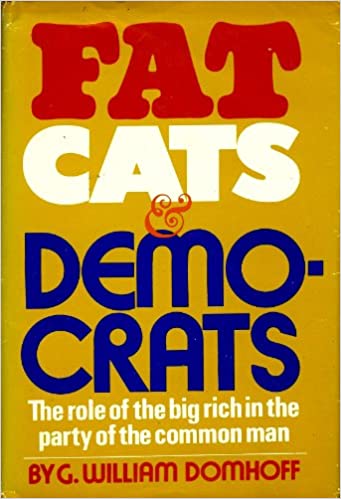 G.
William Domhoff, a Distinguished Professor Emeritus at the University of
California, Santa Cruz, wrote, "Fat Cats & Democrats: The Role of the Big Rich
in the Party of the Common Man."
G.
William Domhoff, a Distinguished Professor Emeritus at the University of
California, Santa Cruz, wrote, "Fat Cats & Democrats: The Role of the Big Rich
in the Party of the Common Man."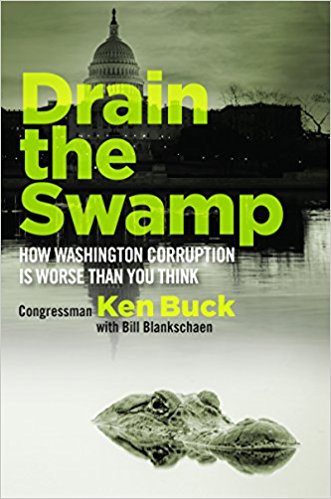 Lavish
parties. Committee chairmanships for sale. Pay-to-play corruption. Backroom
arm-twisting. Votes on major legislation going to the highest bidder. Welcome to
Washington, D.C., the swamp that President Donald Trump was elected to drain.
Lavish
parties. Committee chairmanships for sale. Pay-to-play corruption. Backroom
arm-twisting. Votes on major legislation going to the highest bidder. Welcome to
Washington, D.C., the swamp that President Donald Trump was elected to drain.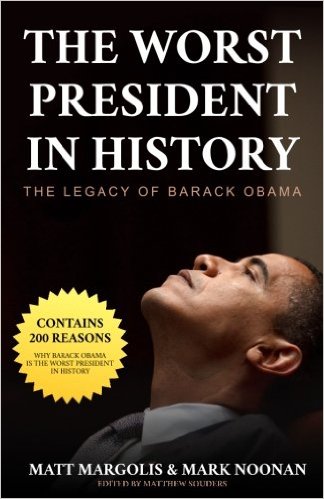 I
wish it were hyperbole, but "The Worst President in History: The Legacy of
Barack Obama" is an accurate and well-documented assessment of the 44th
presidency.
I
wish it were hyperbole, but "The Worst President in History: The Legacy of
Barack Obama" is an accurate and well-documented assessment of the 44th
presidency.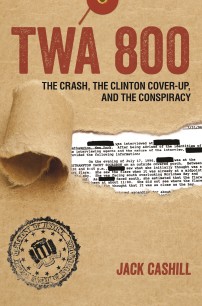 TWA 800,
by Jack Cashill (Regnery History, 352 pages) will go on sale July 5, 2016.
TWA 800,
by Jack Cashill (Regnery History, 352 pages) will go on sale July 5, 2016.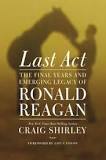 The history of Ronald Reagan’s
life would be incomplete without a clear understanding of his final years after
leaving the White House in 1989. This is the subject of leading Reagan
biographer Craig Shirley’s splendid new book, Last Act. Building his narrative
around the historic week of the President’s passing – from the day of his death,
Saturday, June 5, 2004 through his burial on June 12 – Shirley skillfully weaves
in key events from the President’s life and their indelible impact on people and
history.
The history of Ronald Reagan’s
life would be incomplete without a clear understanding of his final years after
leaving the White House in 1989. This is the subject of leading Reagan
biographer Craig Shirley’s splendid new book, Last Act. Building his narrative
around the historic week of the President’s passing – from the day of his death,
Saturday, June 5, 2004 through his burial on June 12 – Shirley skillfully weaves
in key events from the President’s life and their indelible impact on people and
history.  The best mob story
ever told does not involve Al Capone or Bugsy Segal or John Gotti. It involves a
mobster few American have ever heard of, Greg Scarpa by name, and his not quite
as lethal son, Greg Scarpa Jr., "Junior" going forward.
The best mob story
ever told does not involve Al Capone or Bugsy Segal or John Gotti. It involves a
mobster few American have ever heard of, Greg Scarpa by name, and his not quite
as lethal son, Greg Scarpa Jr., "Junior" going forward.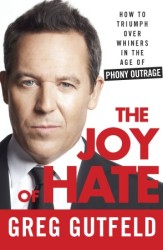 Greg
Gutfeld hates artificial tolerance. At the root of every single major political
conflict is the annoying coddling Americans must endure of these harebrained
liberal hypocrisies. In fact, most of the time liberals uses the mantle of
tolerance as a guise for their pathetic intolerance. And what we really need is
smart intolerance, or as Gutfeld reminds us, what we used to call common sense.
(Random House, 256 pages)
Greg
Gutfeld hates artificial tolerance. At the root of every single major political
conflict is the annoying coddling Americans must endure of these harebrained
liberal hypocrisies. In fact, most of the time liberals uses the mantle of
tolerance as a guise for their pathetic intolerance. And what we really need is
smart intolerance, or as Gutfeld reminds us, what we used to call common sense.
(Random House, 256 pages)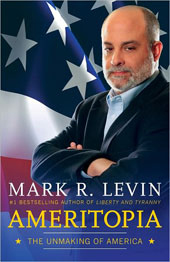 When I came across the line that "Utopia misapprehends man's nature," I had to
stop reading and make a note to self. I do this with any brilliantly succinct
and accurate notion. This line was so good that I wish I had written it myself.
I had not.
When I came across the line that "Utopia misapprehends man's nature," I had to
stop reading and make a note to self. I do this with any brilliantly succinct
and accurate notion. This line was so good that I wish I had written it myself.
I had not.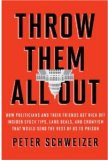 Crony capitalism is the
most serious current danger to the American community, a threat not simply to
government or the economy, but to our very way of life. It is the worst such
threat since the trusts and monopolies of the early 20th century, and in much
the same way. Cronyism is one of the major forces behind the establishment of
the corrupt pseudo-aristocracy that has been taking shape in this country over
the past two decades, a synthetic privileged class made up in large part of
politicians, hustlers, and hangers-on who have become expert in exploiting the
rest of us.
Crony capitalism is the
most serious current danger to the American community, a threat not simply to
government or the economy, but to our very way of life. It is the worst such
threat since the trusts and monopolies of the early 20th century, and in much
the same way. Cronyism is one of the major forces behind the establishment of
the corrupt pseudo-aristocracy that has been taking shape in this country over
the past two decades, a synthetic privileged class made up in large part of
politicians, hustlers, and hangers-on who have become expert in exploiting the
rest of us.  As America's premier federal
law enforcement agency, the Justice Department is supposed to be color-blind and
immune from party politics.
As America's premier federal
law enforcement agency, the Justice Department is supposed to be color-blind and
immune from party politics.  Loss haunts
Charlie Cahill. He has lost his belief in the great game of the law, a game that
is fixed from the beginning. He lost his father, who drowned during Prohibition
smuggling whiskey across the Detroit River. He lost his left arm below the elbow
to German machine-gun fire on D-Day. And he may lose the one thing that still
matters to him, the woman who rescued him from his own despair.
Loss haunts
Charlie Cahill. He has lost his belief in the great game of the law, a game that
is fixed from the beginning. He lost his father, who drowned during Prohibition
smuggling whiskey across the Detroit River. He lost his left arm below the elbow
to German machine-gun fire on D-Day. And he may lose the one thing that still
matters to him, the woman who rescued him from his own despair. Kevin R. C. Gutzman, associate
professor of history at Western Connecticut State University, has written
Virginia's American Revolution: From Dominion to Republic, 1776-1840
(Lexington Press, 248 pages) exploring the assumptions of sovereignty the
colonies had when they ratified the Constitution.
Kevin R. C. Gutzman, associate
professor of history at Western Connecticut State University, has written
Virginia's American Revolution: From Dominion to Republic, 1776-1840
(Lexington Press, 248 pages) exploring the assumptions of sovereignty the
colonies had when they ratified the Constitution. In a new book by Peter
Schweizer, Makers and Takers (Doubleday, 258 pages), he expands his
critique of modern American liberals to contend that liberalism not only leads
to social decay, but can also lead to personal decay. Drawing upon polls and
psychological studies, the author argues that conservatives work harder, feel
happier, have closer families, take fewer drugs, give more generously, value
honesty more, are less materialistic and envious, whine less and even hug their
children more than liberals.
In a new book by Peter
Schweizer, Makers and Takers (Doubleday, 258 pages), he expands his
critique of modern American liberals to contend that liberalism not only leads
to social decay, but can also lead to personal decay. Drawing upon polls and
psychological studies, the author argues that conservatives work harder, feel
happier, have closer families, take fewer drugs, give more generously, value
honesty more, are less materialistic and envious, whine less and even hug their
children more than liberals.  The
Competitive Enterprise Institute (CEI) announced a provocative new book on
environmental policy, Blue Planet in Green Shackles by Václav Klaus, President
of the Czech Republic. President Klaus makes the case that policies being
proposed to address global warming are not justified by current science and are,
in fact, a dangerous threat to freedom and prosperity around the world.
Klaus argues that the environmental movement has transformed itself into an
ideology that seeks to restrict human activities at any cost, while pursuing an
impossible utopian dream of a perfectly "natural" world. The supposed threat of
human civilization against a fragile Earth has become an article of faith,
especially in the realm of global warming activism.
The
Competitive Enterprise Institute (CEI) announced a provocative new book on
environmental policy, Blue Planet in Green Shackles by Václav Klaus, President
of the Czech Republic. President Klaus makes the case that policies being
proposed to address global warming are not justified by current science and are,
in fact, a dangerous threat to freedom and prosperity around the world.
Klaus argues that the environmental movement has transformed itself into an
ideology that seeks to restrict human activities at any cost, while pursuing an
impossible utopian dream of a perfectly "natural" world. The supposed threat of
human civilization against a fragile Earth has become an article of faith,
especially in the realm of global warming activism.
 Benjamin Powell
has edited a study published by Stanford Economics and Finance (480 pages) with
chapters by a series of authors who have studies the economies of different
countries around the world.
Benjamin Powell
has edited a study published by Stanford Economics and Finance (480 pages) with
chapters by a series of authors who have studies the economies of different
countries around the world. The
greatest obstacle to sound economic policy is not entrenched special interests
or rampant lobbying, but the popular misconceptions, irrational beliefs, and
personal biases held by ordinary voters. This is economist Bryan Caplan's
sobering assessment in this provocative and eye-opening book. Caplan argues that
voters continually elect politicians who either share their biases or else
pretend to, resulting in bad policies winning again and again by popular demand.
The
greatest obstacle to sound economic policy is not entrenched special interests
or rampant lobbying, but the popular misconceptions, irrational beliefs, and
personal biases held by ordinary voters. This is economist Bryan Caplan's
sobering assessment in this provocative and eye-opening book. Caplan argues that
voters continually elect politicians who either share their biases or else
pretend to, resulting in bad policies winning again and again by popular demand.
 Nathaniel
Helms, in My Men Are My Heroes: The Brad Kasal Story, (Meridith
Books, 288 pages) tells the story of a man from Afton, Iowa, a combat veteran
with 20 years experience, who as a Sergeant Major in the Marine Corps performed
extraordinarily under fire.
Nathaniel
Helms, in My Men Are My Heroes: The Brad Kasal Story, (Meridith
Books, 288 pages) tells the story of a man from Afton, Iowa, a combat veteran
with 20 years experience, who as a Sergeant Major in the Marine Corps performed
extraordinarily under fire. The complicated business of understanding how Ronald Reagan
led the Free World to victory in the Cold War has just become much easier.
Run to your nearest bookstore and buy a copy of The Crusader. In one
beautifully-written volume, Grove City College Professor Paul Kengor's got the
whole story - completely, accurately, and with more fascinating and
never-before-reported details about how Ronald Reagan succeeded -- than any
other Cold War historian, including "official biographer" Edmund Morris.
The complicated business of understanding how Ronald Reagan
led the Free World to victory in the Cold War has just become much easier.
Run to your nearest bookstore and buy a copy of The Crusader. In one
beautifully-written volume, Grove City College Professor Paul Kengor's got the
whole story - completely, accurately, and with more fascinating and
never-before-reported details about how Ronald Reagan succeeded -- than any
other Cold War historian, including "official biographer" Edmund Morris.
 Pat Buchanan
has a new book out which is receiving rave reviews in every conservative venue.
Pat Buchanan
has a new book out which is receiving rave reviews in every conservative venue. Myths and Misconceptions
covered in the book include:
Myths and Misconceptions
covered in the book include: Bing
West, a Marine veteran, who accompanied the First Marine Division on its sprint
to Baghdad in April-May 2003, together with his co-author,
Bing
West, a Marine veteran, who accompanied the First Marine Division on its sprint
to Baghdad in April-May 2003, together with his co-author,  He
has now written No True Glory (Bantam, 400 pages), which describes the
battle for Falluja, the superhuman courage and dedication of the Marines in
April of 2004, the withdrawal at the request of the politicians, and the second
assault in November of that year.
He
has now written No True Glory (Bantam, 400 pages), which describes the
battle for Falluja, the superhuman courage and dedication of the Marines in
April of 2004, the withdrawal at the request of the politicians, and the second
assault in November of that year. In
the Shadow of Satan (Keller Publishing, 316 pages) is a compilation of
memories, first of a young boy, and then of a young adult, from the bloodiest
period of 20th century Europe—during the days of the Second World War and Soviet
occupation. These tragic events are described as seen through the young eyes of
an eyewitness to history. Having lived daily in the shadow of those two satans—Nazism
and communism—the author startlingly reveals an even more true picture than
contemporary writing could ever accomplish.
In
the Shadow of Satan (Keller Publishing, 316 pages) is a compilation of
memories, first of a young boy, and then of a young adult, from the bloodiest
period of 20th century Europe—during the days of the Second World War and Soviet
occupation. These tragic events are described as seen through the young eyes of
an eyewitness to history. Having lived daily in the shadow of those two satans—Nazism
and communism—the author startlingly reveals an even more true picture than
contemporary writing could ever accomplish. Mark R. Levin,
one of America's preeminent conservative commentators and constitutional lawyers
has weighed in on the federal judiciary with his Men in Black: How the
Supreme Court is Destroying America. (Regnery, 256 pages)
Mark R. Levin,
one of America's preeminent conservative commentators and constitutional lawyers
has weighed in on the federal judiciary with his Men in Black: How the
Supreme Court is Destroying America. (Regnery, 256 pages)  Expanding
on a theme he raised on the Senate floor in February of 2004, Zell Miller wrote
A Deficit of Decency (Stroud & Hall, 288 pages). The book addresses
specific issues where Miller sees a need to return to a basic sense of duty.
Expanding
on a theme he raised on the Senate floor in February of 2004, Zell Miller wrote
A Deficit of Decency (Stroud & Hall, 288 pages). The book addresses
specific issues where Miller sees a need to return to a basic sense of duty.  In Reagan's Revolution
(Thomas Nelson, 448 pages) Craig Shirley tells the fascinating story of the 1976
presidential campaign which redefined the Republican party, reshaped national
politics, and ended the reign of liberalism.
In Reagan's Revolution
(Thomas Nelson, 448 pages) Craig Shirley tells the fascinating story of the 1976
presidential campaign which redefined the Republican party, reshaped national
politics, and ended the reign of liberalism. In
this riveting memoir, American Soldier, (ReganBooks, 590 pages), General
Tommy Franks retraces his journey from a small-town boyhood in Oklahoma and
Midland, Texas, through a lifetime of military service. From Vietnam,
through the Cold War, Operation Desert Storm, he tells the story of how he
became the senior American military officer in the most dangerous region on
earth.
In
this riveting memoir, American Soldier, (ReganBooks, 590 pages), General
Tommy Franks retraces his journey from a small-town boyhood in Oklahoma and
Midland, Texas, through a lifetime of military service. From Vietnam,
through the Cold War, Operation Desert Storm, he tells the story of how he
became the senior American military officer in the most dangerous region on
earth. This
book, originally published in 1948, and reprinted as a 50th anniversary edition
in 1998, will enlighten readers on all the things you know that just aren't
true.
This
book, originally published in 1948, and reprinted as a 50th anniversary edition
in 1998, will enlighten readers on all the things you know that just aren't
true. John
Stossel, 20/20 host traveled the path from crusading reporter for leftist causes
to libertarian proponent of the free market and opponent of big government.
John
Stossel, 20/20 host traveled the path from crusading reporter for leftist causes
to libertarian proponent of the free market and opponent of big government. A
review in Human Events showcases Randall Fitzgerald's new book, Mugged
by the State: Outrageous Government Assaults on Ordinary People and Their
Property (Regnery, 155 pages). It describes how common, ordinary
American citizens have been subjected to government abuse. Fitzgerald, a
veteran journalist, provides many riveting examples of ranchers, homeowners and
small businessmen who have encountered the wrath of bureaucrats and regulators,
who in the zeal of enforcing cumbersome government regulations, have seized
homes, private property, cars, bank accounts, and closed down businesses in the
interest of "public safety" and the "public
good."
A
review in Human Events showcases Randall Fitzgerald's new book, Mugged
by the State: Outrageous Government Assaults on Ordinary People and Their
Property (Regnery, 155 pages). It describes how common, ordinary
American citizens have been subjected to government abuse. Fitzgerald, a
veteran journalist, provides many riveting examples of ranchers, homeowners and
small businessmen who have encountered the wrath of bureaucrats and regulators,
who in the zeal of enforcing cumbersome government regulations, have seized
homes, private property, cars, bank accounts, and closed down businesses in the
interest of "public safety" and the "public
good."  Midge
Decter, in her biography, The Rumsfeld Way: The Leadership Wisdom of a
Battle-hardened Maverick (Regan, 220 pages) follows Donald Rumsfeld from his
early years to the present. In every position he has ever held, in the
private or public sector, he has been a dogged reformer. This book
provides an enlightening and provocative look at the man The Washington Post
has called "the Articulator in Chief," and outlines the leadership
skills, methods, and strategies that have made Secretary of Defense Rumsfeld one
of today's most trusted and accomplished public figures.
Midge
Decter, in her biography, The Rumsfeld Way: The Leadership Wisdom of a
Battle-hardened Maverick (Regan, 220 pages) follows Donald Rumsfeld from his
early years to the present. In every position he has ever held, in the
private or public sector, he has been a dogged reformer. This book
provides an enlightening and provocative look at the man The Washington Post
has called "the Articulator in Chief," and outlines the leadership
skills, methods, and strategies that have made Secretary of Defense Rumsfeld one
of today's most trusted and accomplished public figures.
 Rating
the First Ladies (Citadel Press, 288 pages), by John B Roberts, II, "is
an absorbing book that accomplishes something never before attempted: assessing,
in one book, the explicitly political contributions of each of the 37 first
ladies to the presidents of the United States -- from Martha Washington to Laura
Bush," according to Tony Blankley in the Washington Times weekly
edition of September 22-28, 2003. He went on: "Although I like to
think I am reasonably well-read on America's political history, I learned
something interesting, often relevatory, about those histories on almost every
page."
Rating
the First Ladies (Citadel Press, 288 pages), by John B Roberts, II, "is
an absorbing book that accomplishes something never before attempted: assessing,
in one book, the explicitly political contributions of each of the 37 first
ladies to the presidents of the United States -- from Martha Washington to Laura
Bush," according to Tony Blankley in the Washington Times weekly
edition of September 22-28, 2003. He went on: "Although I like to
think I am reasonably well-read on America's political history, I learned
something interesting, often relevatory, about those histories on almost every
page." In
1982, as a young man, Peter Robinson was hired as a speechwriter in the Reagan
White House. During the six years that followed, he was one of a core
group writers who became informal experts on Reagan, absorbing not just his
political positions but his personality, manner, and way of carrying
himself. The example Reagan set -- as a confident, passionate, principled,
generous-spirited older man -- molded Robinson's outlook just as he was coming
into his own.
In
1982, as a young man, Peter Robinson was hired as a speechwriter in the Reagan
White House. During the six years that followed, he was one of a core
group writers who became informal experts on Reagan, absorbing not just his
political positions but his personality, manner, and way of carrying
himself. The example Reagan set -- as a confident, passionate, principled,
generous-spirited older man -- molded Robinson's outlook just as he was coming
into his own.  Phil Kent,
president of Southeastern Legal Foundation, lays bare the falsehoods and
distorted messages of liberalism and exposes it for what it is -- an outdated,
negative, anti-American gospel that mockingly undermines the values that made
this country great. In The Dark Side of Liberalism: Unchaining the
Truth (Harbor House Books, 226 pages) he offers a fresh look at America's
big ticket issues -- race relations, political correctness, immigration,
Hollywood, the media, the United Nations, the runaway court system, the war on
terror, and Big Government's role in our lives.
Phil Kent,
president of Southeastern Legal Foundation, lays bare the falsehoods and
distorted messages of liberalism and exposes it for what it is -- an outdated,
negative, anti-American gospel that mockingly undermines the values that made
this country great. In The Dark Side of Liberalism: Unchaining the
Truth (Harbor House Books, 226 pages) he offers a fresh look at America's
big ticket issues -- race relations, political correctness, immigration,
Hollywood, the media, the United Nations, the runaway court system, the war on
terror, and Big Government's role in our lives. In
his newest book, The Bias Against Guns: Why Almost Everything You've Heard
About Gun Control Is Wrong (Regnery, 349 pages), economist John Lott, who
has held positions at Yale Law School, the University of Chicago, UCLA and
Stanford University, has put together an original study from empirical research
that demonstrates every plausible facet of the pro-gun position.
In
his newest book, The Bias Against Guns: Why Almost Everything You've Heard
About Gun Control Is Wrong (Regnery, 349 pages), economist John Lott, who
has held positions at Yale Law School, the University of Chicago, UCLA and
Stanford University, has put together an original study from empirical research
that demonstrates every plausible facet of the pro-gun position. In
her recent book, Useful Idiots: How Liberals Got It Wrong in the Cold War and
Still Blame America First (Regnery, 308 pages), Mona Charen uses
Stalin's description of the American left in the Cold War to show the similarity
between today's left and the previous Communist sympathizers. She offers a
moral indictment of those public figures, politicians, entertainers and
professors who stubbornly refused to see communism as the brutal, dictatorial,
death machine it was.
In
her recent book, Useful Idiots: How Liberals Got It Wrong in the Cold War and
Still Blame America First (Regnery, 308 pages), Mona Charen uses
Stalin's description of the American left in the Cold War to show the similarity
between today's left and the previous Communist sympathizers. She offers a
moral indictment of those public figures, politicians, entertainers and
professors who stubbornly refused to see communism as the brutal, dictatorial,
death machine it was. J. Martin Rochester is The Curators'
Distinguished Teaching Professor of Political Science at the University of
Missouri - St. Louis. He is the author of several books on international
politics and has written widely on the subject of education.
J. Martin Rochester is The Curators'
Distinguished Teaching Professor of Political Science at the University of
Missouri - St. Louis. He is the author of several books on international
politics and has written widely on the subject of education. THE
REVOLUTION
THE
REVOLUTION A
MAN OF PRINCIPLE
A
MAN OF PRINCIPLE J. C. Watts' father, Buddy never went
past two days into the 7th grade, and yet despite the economic obstacles he
faced, his dynamism never failed. Buddy Watts was a Democrat who voted
Republican. He taught J. C. "The only helping hand you can count on
is the one at the end of your sleeve."
J. C. Watts' father, Buddy never went
past two days into the 7th grade, and yet despite the economic obstacles he
faced, his dynamism never failed. Buddy Watts was a Democrat who voted
Republican. He taught J. C. "The only helping hand you can count on
is the one at the end of your sleeve." LIBERALISM
MUST BE STOPPED
LIBERALISM
MUST BE STOPPED AMERICAN
CHEERLEADER
AMERICAN
CHEERLEADER WAR
LETTERS
WAR
LETTERS THOUGHT
POLICE
THOUGHT
POLICE WAS FRANKLIN THE KEY?
WAS FRANKLIN THE KEY? THE
REVOLUTIONS
THE
REVOLUTIONS WHO
IS BJORN LOMBORG?
WHO
IS BJORN LOMBORG? ROBERT
HANSSEN -- TRAITOR
ROBERT
HANSSEN -- TRAITOR WEINBERGER
SPEAKS
WEINBERGER
SPEAKS A
LOOK BACK AT REAGAN
A
LOOK BACK AT REAGAN R.I.P.
BARBARA OLSON
R.I.P.
BARBARA OLSON ambitions in Hell
To Pay (Regnery, 344 pages). While not a literary masterpiece, it is a
fascinating, quick read which should be studied by anyone thinking of voting for
the former First Lady.
ambitions in Hell
To Pay (Regnery, 344 pages). While not a literary masterpiece, it is a
fascinating, quick read which should be studied by anyone thinking of voting for
the former First Lady. ANOTHER
LOOK AT JOE McCARTHY
ANOTHER
LOOK AT JOE McCARTHY AN
OLDIE BUT GOODIE
AN
OLDIE BUT GOODIE SPIRITED
AMERICANS
SPIRITED
AMERICANS THE
LITTLE "RED" SCHOOLHOUSE
THE
LITTLE "RED" SCHOOLHOUSE THE
TRUTH ABOUT THE DEPRESSION
THE
TRUTH ABOUT THE DEPRESSION A
FASCINATING STORY
A
FASCINATING STORY AMIABLE
DUNCE?
AMIABLE
DUNCE? WHERE
BRITAIN WENT WRONG
WHERE
BRITAIN WENT WRONG BETTER
ALL THE TIME
BETTER
ALL THE TIME ANOTHER
LOOK AT POLITICAL CORRECTNESS
ANOTHER
LOOK AT POLITICAL CORRECTNESS A
LOOK A POLITICAL CORRECTNESS
A
LOOK A POLITICAL CORRECTNESS LIBERALISM'S
TRAGIC CONSEQUENCES
LIBERALISM'S
TRAGIC CONSEQUENCES AMERICA IN THE BALANCE
AMERICA IN THE BALANCE WAS
THIS A TRIBE?
WAS
THIS A TRIBE? AN
INTERESTING LOOK AT GLOBALISM
AN
INTERESTING LOOK AT GLOBALISM AMERICA'S
DOUBLE AGENT
AMERICA'S
DOUBLE AGENT HISTORY
GOING DOWN EASY
HISTORY
GOING DOWN EASY SAVING
THE ENVIRONMENT
SAVING
THE ENVIRONMENT TAXES
AND AMERICANS
TAXES
AND AMERICANS A
LOOK INSIDE THE KGB
A
LOOK INSIDE THE KGB WHY
THE WORLD ISN'T FAIR
WHY
THE WORLD ISN'T FAIR
 THE
MAN WHO GAVE AMERICA LANGUAGE
THE
MAN WHO GAVE AMERICA LANGUAGE COMMUNISTS
IN HOLLYWOOD
COMMUNISTS
IN HOLLYWOOD RULES
NOT TAUGHT IN SCHOOL
RULES
NOT TAUGHT IN SCHOOL SOVIET
ESPIONAGE IN AMERICA --
SOVIET
ESPIONAGE IN AMERICA -- GORE INVENTED HIMSELF!
GORE INVENTED HIMSELF! CLINTON IS A LOT MORE LIKE HIS
CLINTON IS A LOT MORE LIKE HIS AN AX MURDERER IN OUR MIDST
AN AX MURDERER IN OUR MIDST MORE
GUNS, LESS CRIME
MORE
GUNS, LESS CRIME THINGS
ARE A WHOLE LOT
THINGS
ARE A WHOLE LOT THE
BOISTEROUS SEA OF LIBERTY
THE
BOISTEROUS SEA OF LIBERTY A
TREAT ON ECONOMICS
A
TREAT ON ECONOMICS YEAR
OF THE RAT
YEAR
OF THE RAT ARE
DEMOCRATS SOCIALISTS?
ARE
DEMOCRATS SOCIALISTS?






